
by Neville Buch | Jul 1, 2024 | Concepts in Public History for Marketplace Dialogue, Concepts in Religious Thought Series
“SOFiA is a network of Australians interested in openly exploring issues of life and meaning through reason, philosophy, ethics, religion, science and the arts. We want to explore for ourselves what we can believe and how we can find meaning in our lives.”
“SOFiA has no philosophical or religious position beyond a desire to ‘openly explore’: it is a forum for discussing ideas, experiences and possibilities.”
“Any who find themselves in sympathy with our purpose – exploring life and meaning in an open and non-dogmatic manner – are most welcome to join us.”
SOFiA website

This draft SoFiA position statement does not seek to change the IDEAL of the above statement, the ideal, though, it does not reflect our current reality. Exploring life and meaning in an open and non-dogmatic manner means accepting the philosophical reality. The ideal can be retained but a position statement should not be vague about how reality is shaping the thinking within the SoFiA organisation. There is no conflict between the SoFiA’s ideal and the fact that the organisation will advance its thinking in diverse ways.
What is the current philosophical reality in SoFiA?
In the last decade there has merged three positionings of thinking, not merely within SoFiA but also in the world that examines “issues of life and meaning through reason, philosophy, ethics, religion, science and the arts.”
NONES: declared no religious or organisational affiliation;
DONES: declared no institutional or formal affiliation;
MAINS: where there is declared affiliation, opposite of “nones” and “dones” and this is the traditional and mainstream outlook (a horizon worldview), and in the “main”, which has not caught up in the “historical delay.”
Lets be clear and frank. All three positions within SoFiA are legitimate, valid in reasoning, and are most welcomed with the SoFiA organisation.
The literature (see references below) has been developing on these three positions, and the point is that, in all three positions, within the positional thinking, the “issues of life and meaning through reason, philosophy, ethics, religion, science and the arts” are all contested. This does not mean that there is no actual positional thinking. The “Nones” most certainly have given up on religious or organisational affiliation. The statistics declare that the “Nones” as the fastest and largest growing grouping in belief systems for intellectually western nations. However, the statistics are most vague what the “Nones” means in terms of positive affirmations. The “Dones” are likely wise not easy to discern and there is some overlap with “Nones.” The difference with “Dones” is the no institutional or formal affiliation which means more than not having religious or organisational affiliation. It is a complete rejection of organised belief.
In reality, that is, in the unthinking ‘congregations’ of society, many of the “Mains” can also be hidden “Nones” or “Dones” and are persons only playing a game of convention. However, there are genuine intellectual “mains” who honestly declared their particular affiliation. They are also welcomed into the SoFiA family. Tradition evolves which means that the ideal and shifting reality can co-exist.
REFERENCES
Allen, I., & Allen, S. (2016). God Terms and Activity Systems: A Definition of Religion for Political Science. Political Research Quarterly, 69(3), 557–570. http://www.jstor.org/stable/44018555
Ammerman, N. T. (2013). Spiritual But Not Religious? Beyond Binary Choices in the Study of Religion. Journal for the Scientific Study of Religion, 52(2), 258–278. http://www.jstor.org/stable/24644008
Baker, J. O., & Smith, B. G. (2009). The Nones: Social Characteristics of the Religiously Unaffiliated. Social Forces, 87(3), 1251–1263. http://www.jstor.org/stable/40345160
Baurain, B. (2011). Common Ground With A Common Faith: Dewey’s Idea of the “Religious.” Education and Culture, 27(2), 74–91. https://www.jstor.org/stable/10.5703/educationculture.27.2.74
Boutyline, A., & Vaisey, S. (2017). Belief Network Analysis: A Relational Approach to Understanding the Structure of Attitudes. American Journal of Sociology, 122(5), 1371–1447. https://www.jstor.org/stable/26545920
Burge, R. P. (2020). How Many “Nones” Are There? Explaining the Discrepancies in Survey Estimates. Review of Religious Research, 62(1), 173–190. http://www.jstor.org/stable/45286731
Condran, J. G., & Tamney, J. B. (1985). Religious “Nones”: 1957 to 1982. Sociological Analysis, 46(4), 415–423. https://doi.org/10.2307/3711157
Djupe, P. A., Neiheisel, J. R., & Conger, K. H. (2018). Are the Politics of the Christian Right Linked to State Rates of the Nonreligious? The Importance of Salient Controversy. Political Research Quarterly, 71(4), 910–922. http://www.jstor.org/stable/26600637
Duncan, A. W. (2017). Sacred Pregnancy in the Age of the “Nones.” Journal of the American Academy of Religion, 85(4), 1089–1115. https://www.jstor.org/stable/48556268
Edgell, P., Hartmann, D., Stewart, E., & Gerteis, J. (2016). Atheists and Other Cultural Outsiders: Moral Boundaries and the Non-Religious in the United States. Social Forces, 95(2), 607–638. http://www.jstor.org/stable/26166844
García, A., & Blankholm, J. (2016). The Social Context of Organized Nonbelief: County-Level Predictors of Nonbeliever Organizations in the United States. Journal for the Scientific Study of Religion, 55(1), 70–90. http://www.jstor.org/stable/26651414
Glendinning, Tony. (2006). Religious Involvement, Conventional Christian, and Unconventional Nonmaterialist Beliefs. Journal for the Scientific Study of Religion, 45(4), 585–595. http://www.jstor.org/stable/4621937
Goldstein, Michael. “Adjusting Belief Structures.” Journal of the Royal Statistical Society. Series B (Methodological) 50, no. 1 (1988): 133–54. http://www.jstor.org/stable/2345816.
Greer, B. A., & Roof, W. C. (1992). “Desperately Seeking Sheila”: Locating Religious Privatism in American Society. Journal for the Scientific Study of Religion, 31(3), 346–352. https://doi.org/10.2307/1387125
Hadaway, C. K., & Roof, W. C. (1979). Those Who Stay Religious “Nones” and Those Who Don’t: A Research Note. Journal for the Scientific Study of Religion, 18(2), 194–200. https://doi.org/10.2307/1385940
Hilbert, R. A. (1987). Bureaucracy as Belief, Rationalization as Repair: Max Weber in a Post-Functionalist Age. Sociological Theory, 5(1), 70–86. https://doi.org/10.2307/201996
Hout, M., & Fischer, C. S. (2002). Why More Americans Have No Religious Preference: Politics and Generations. American Sociological Review, 67(2), 165–190. https://doi.org/10.2307/3088891
Jenkins, J. R. (2020). Is Religiosity a Black Thing?: Reading the Black None in Octavia E. Butler’s “The Book of Martha.” Pacific Coast Philology, 55(1), 5–22. https://doi.org/10.5325/pacicoasphil.55.1.0005
Jung, J. H. (2015). Sense of Divine Involvement and Sense of Meaning in Life: Religious Tradition as a Contingency. Journal for the Scientific Study of Religion, 54(1), 119–133. http://www.jstor.org/stable/24644249
Kalmoe, N. P. (2020). Uses and Abuses of Ideology in Political Psychology. Political Psychology, 41(4), 771–793. http://www.jstor.org/stable/45295275
Lim, C., MacGregor, C. A., & Putnam, R. D. (2010). Secular and Liminal: Discovering Heterogeneity Among Religious Nones. Journal for the Scientific Study of Religion, 49(4), 596–618. http://www.jstor.org/stable/40959050
Lim, C. (2015). Religion and Subjective Well-Being Across Religious Traditions: Evidence from 1.3 Million Americans. Journal for the Scientific Study of Religion, 54(4), 684–701. http://www.jstor.org/stable/26651391
Miller, C. (2016). “Spiritual But Not Religious”: Rethinking the Legal Definition of Religion. Virginia Law Review, 102(3), 833–894. http://www.jstor.org/stable/43923324
Olson, P. J., & Beckworth, D. (2011). Religious Change and Stability: Seasonality in Church Attendance from the 1940s to the 2000s. Journal for the Scientific Study of Religion, 50(2), 388–396. http://www.jstor.org/stable/41307082
Packard, J., & Ferguson, T. W. (2019). Being Done: Why People Leave the Church, But Not Their Faith. Sociological Perspectives, 62(4), 499–517. https://www.jstor.org/stable/26746198
Salinas, A. (2010). Political Philosophy in Borges: Fallibility, Liberal Anarchism, and Civic Ethics. The Review of Politics, 72(2), 299–324. http://www.jstor.org/stable/20780307
Schnell, T., & Keenan, W. J. F. (2011). Meaning-Making in an Atheist World. Archiv Für Religionspsychologie / Archive for the Psychology of Religion, 33(1), 55–78. http://www.jstor.org/stable/23918907
Sepulvado, B., Hachen, D., Penta, M., & Lizardo, O. (2015). Social Affiliation from Religious Disaffiliation: Evidence of Selective Mixing Among Youth with No Religious Preference During the Transition to College. Journal for the Scientific Study of Religion, 54(4), 833–841. http://www.jstor.org/stable/26651399
Sheils, Dean. (1980). The Great Ancestors Are Watching A Cross-Cultural Study of Superior Ancestral Religion. Sociological Analysis, 41(3), 247–257. https://doi.org/10.2307/3710401
Strhan, A., & Shillitoe, R. (2019). The Stickiness of Non-Religion? Intergenerational Transmission and the Formation of Non-Religious Identities in Childhood. Sociology, 53(6), 1094–1110. https://www.jstor.org/stable/26972328
Tamney, J. B., Powell, S., & Johnson, S. (1989). Innovation Theory and Religious Nones. Journal for the Scientific Study of Religion, 28(2), 216–229. https://doi.org/10.2307/1387060
Thiessen, J., & Wilkins-Laflamme, S. (2017). Becoming a Religious None: Irreligious Socialization and Disaffiliation. Journal for the Scientific Study of Religion, 56(1), 64–82. http://www.jstor.org/stable/26651857
Vernon, G. M. (1968). The Religious “Nones”: A Neglected Category. Journal for the Scientific Study of Religion, 7(2), 219–229. https://doi.org/10.2307/1384629
Wilkins-Laflamme, S. (2016). Secularization and the Wider Gap in Values and Personal Religiosity Between the Religious and Nonreligious. Journal for the Scientific Study of Religion, 55(4), 717–736. http://www.jstor.org/stable/26651610
Zwingmann, C., & Gottschling, S. (2015). Religiosity, Spirituality, and God Concepts: Interreligious and Interdenominational Comparisons Within a German Sample. Archiv Für Religionspsychologie / Archive for the Psychology of Religion, 37(1), 98–116. http://www.jstor.org/stable/43973388

Neville Buch
Historian,
President, Sea of Faith in Australia Inc. (SoFiA)
Professional Historians Australia (Queensland)
Australian and New Zealand History of Education Society (ANZHES)
Convenor, Sociology of Education Thematic Group, The Australian Sociological Association (TASA).
President, Southern Brisbane Suburban Forum (SBSF).
Director, Brisbane Southside History Network (BSHN).
MPHA (Qld), Ph.D. (History) UQ., Grad. Dip. Arts (Philosophy) Melb., Grad. Dip. (Education) UQ.


by Neville Buch | Nov 5, 2023 | Concepts in Public History for Marketplace Dialogue, Mapping Brisbane History, Value of Local History
By Neville Buch, Ph.D., MPHA
Third Paper, Exploratory, Version for
2023 Sydney TASA Conference
Slide 1. Introduction
In preparing the publication and presentation papers for the Sydney TASA Conference, at the end of November 2023, this is a third paper, an exploratory pre-look at the arguments, explaining the sociological models in more detail than the first two papers.
The narrative for all three TASA papers is held together in the process of the professional middle class rebelling against the “business-as-usual” politics and the “set-and-forget” policies. In the global scoping of the thinking the 2023 International Sociology Association’s world congress (ISA) in Melbourne, picked up these themes in various plenaries and session papers.
Slide 2. 2023 International Sociology Association’s world congress (ISA)
The wider state of affairs demonstrates a deeper philosophic and political problem, in that sandstone universities, while shifted in naming to the multidisciplinary approaches, generally fail to consider local and regional factors in sufficient interdisciplinary scoping. This is because there is a misunderstanding: the difference between multidisciplinary and interdisciplinary. The former lines-up one story after the other from disciplinary perspectives. The latter tells one story of the fit of the stories of disciplinary perspectives: history, geography, sociology, etc. The ISA Congress was an interdisciplinary affair in many of the research papers.

Image: 2023–06-25 ISA Neville just walked into the Congress
Slide 3. Sara Hanafi’s Dialogical Political Liberalism
Sara Hanafi, the ISA President, spoke on his Dialogical Political Liberal Project. Liberal Democracies generally follow Rawls, since his ‘A Theory of Justice’ (1971), and the problem has been the inferred-thinking of the consumer-driven individualism, which Hanafi calls, as developing over the last few decades, the ideology of ‘Symbolic Liberalism’. As a solution Hanafi has argued for the Dialogical Political Liberalism.
This means open consultation in the liberal society on different visions of justice and the common good between different communities. We share an urban environment but the understanding of the ‘urban’ – different semantics – needs to be articulated and the common ground – a universal good – found.

Image: 2023-06-25 Sara Hanafi, ISA President, on his Dialogical Political Liberal Project
Slide 4. David Lowenthal, Randall Collins, Allan Megill
Resisting the types of compatibilist effort are the processes or governance and bureaucracy which normatively – ‘business-as-usual’ – maintain the mechanics of the social system in a non-transparent malaise – ‘set-and-forget’. For the comfortable middle classes everything changes while nothing changes. Adjoining the argument of work are other historians and sociologists: David Lowenthal, Randall Collins, Allan Megill. These are the interdisciplinary sources.

Image: Three American Systems Thinkers
Slide 5. Ivan Illich and Michael Macklin
Juan Piovani, in “The Idea of Conviviality and Its Methodological Implications” (Universidad Nacional de La Plata, Argentina), spoke about the term, Conviviality, as coming from the book Tools of conviviality, by Ivan Illich (1973).
In 1973 Ivan Illich, defined the convivial society entailing “. . . autonomous and creative intercourse among persons, and the intercourse of persons with this environment; . . . individual freedom realized in personal independence” (Illich 1973: 11; Avant 1975: 999-1000). The point is significant for the examination before the reader.
It was former Franciscan, former Democrat Senator for Queensland, and former Dean at the University of New England, Dr. Michael Macklin, who had introduced the pedagogy and andragogy of Ivan Illich to Australia during the mid-1970s.
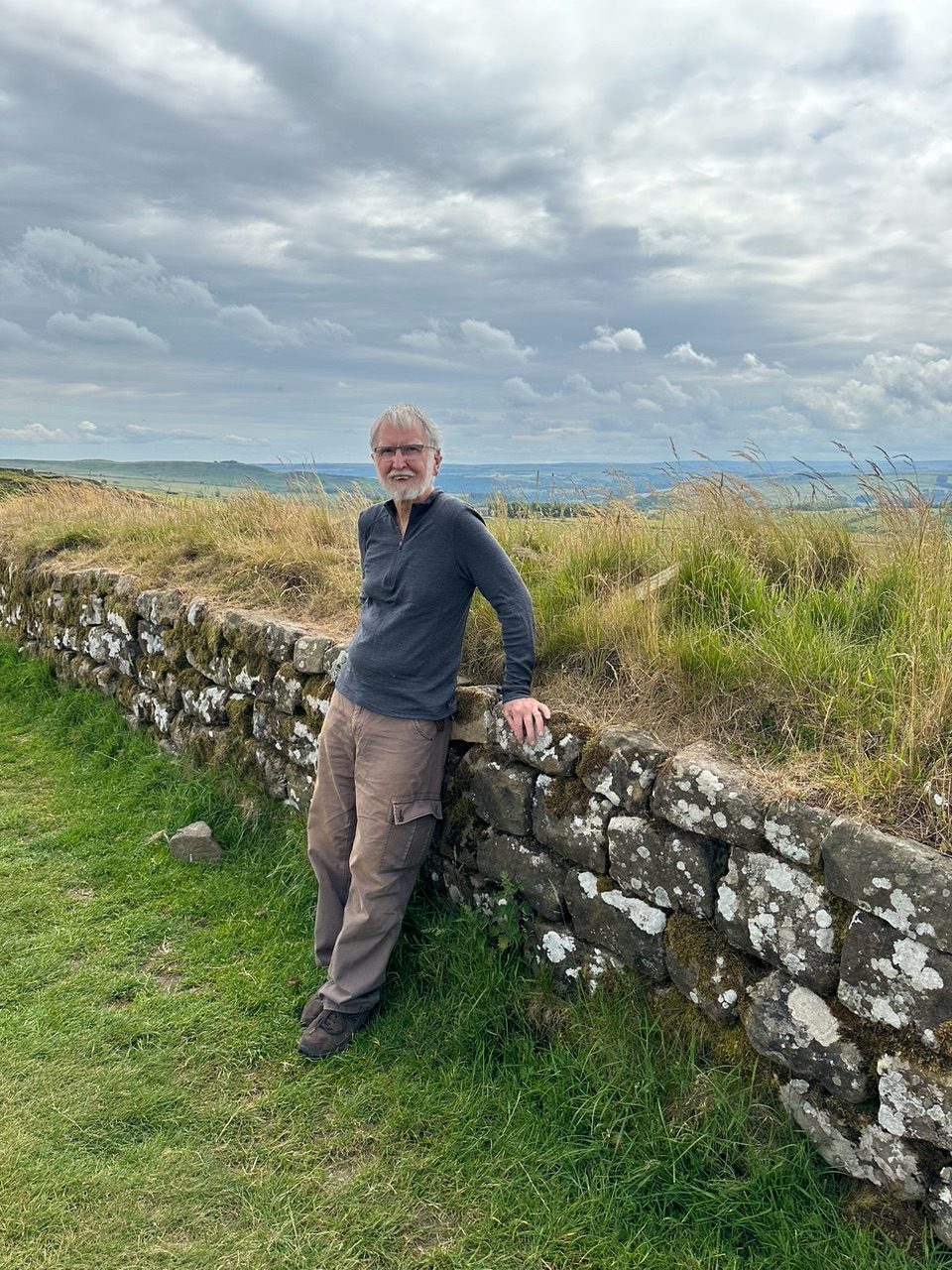
Image: 2023. Michael Macklin at Hadrian Wall
Slide 6. Plato and Aristotle
In Plato’s records of the Socratic Dialogue ‘the Academy’ was the ‘outside communities’, outside of institutional structures. What is important in the question of Conviviality is understanding what is institutional and what is not. The current historical climate is a matter when the academy and outside communities have again collapsed into each other.
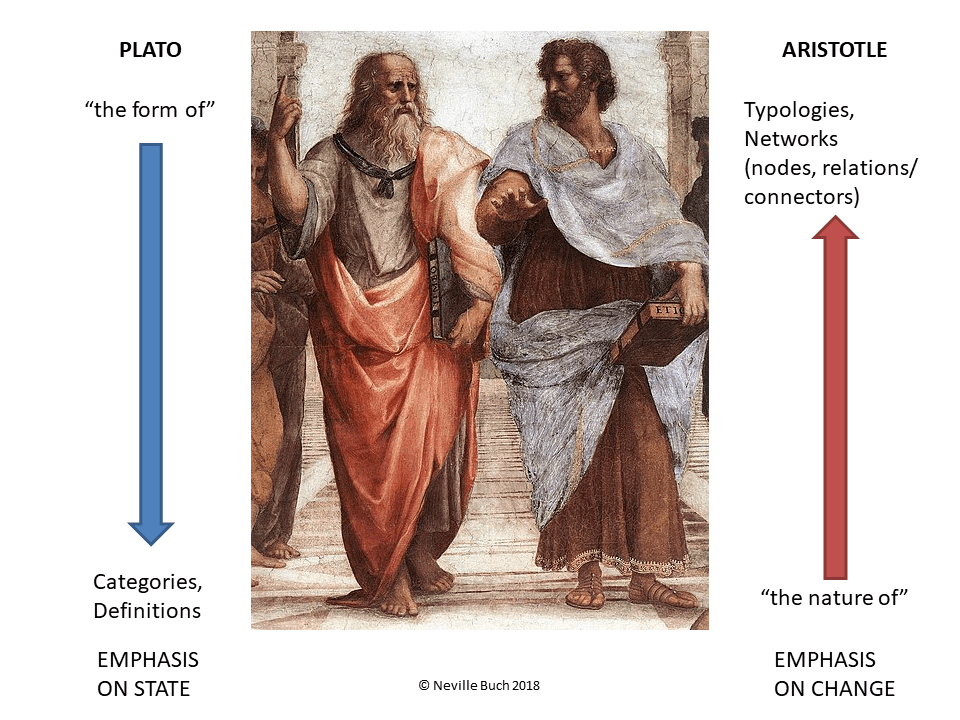
Slide 7. Definitions
This leads to the capacity to map out definitions to understanding the width of contemporary semantics, and this allows us to understand how the academy and outside communities have again collapsed into each other.
The mapping of the definitional table (below) is the fairest approach in the semantic. Most public conversations appear to be guided by the understanding of ‘culture’. It is central. One side of the political spectrum are conversations in, on, against, about, religion and institutions. The side are conversations in, on, against, about, humanity and spirituality. This is the space where semantic misunderstandings occur. It drives the Emotion, Caring, and Conviviality.
A very few scholars truly – that is, the epistemic ‘fit’ – have engaged in local urban sociology with interdisciplinary knowledge. For example, the talk of the sociologists, the Council, and the State show no historical measurement. The political willingness to comprehensively scope is the key to understanding. It is the historiographical methodology of the combined synoptic vision with the geographic concepts of scaling, scoping, and mapping. Synoptic Vision can be obtained. The point of the synoptic consensus is that knowledge is constructed as the human mind. What is achieved is a qualitative measure, bearing in mind that sociological models are artificial; they are not what is normatively assumed as the existence of the natural world. Reality is often said to be ‘natural’ rather than metaphysical, but it is the projection of a cognised pattern. In such case the old ancient-medieval debate of philosophy matters little, and the synoptic knowledge provide the best insights into probable futures.
Table: Definitions for Emotion-Caring-Convivial Urban Sociology
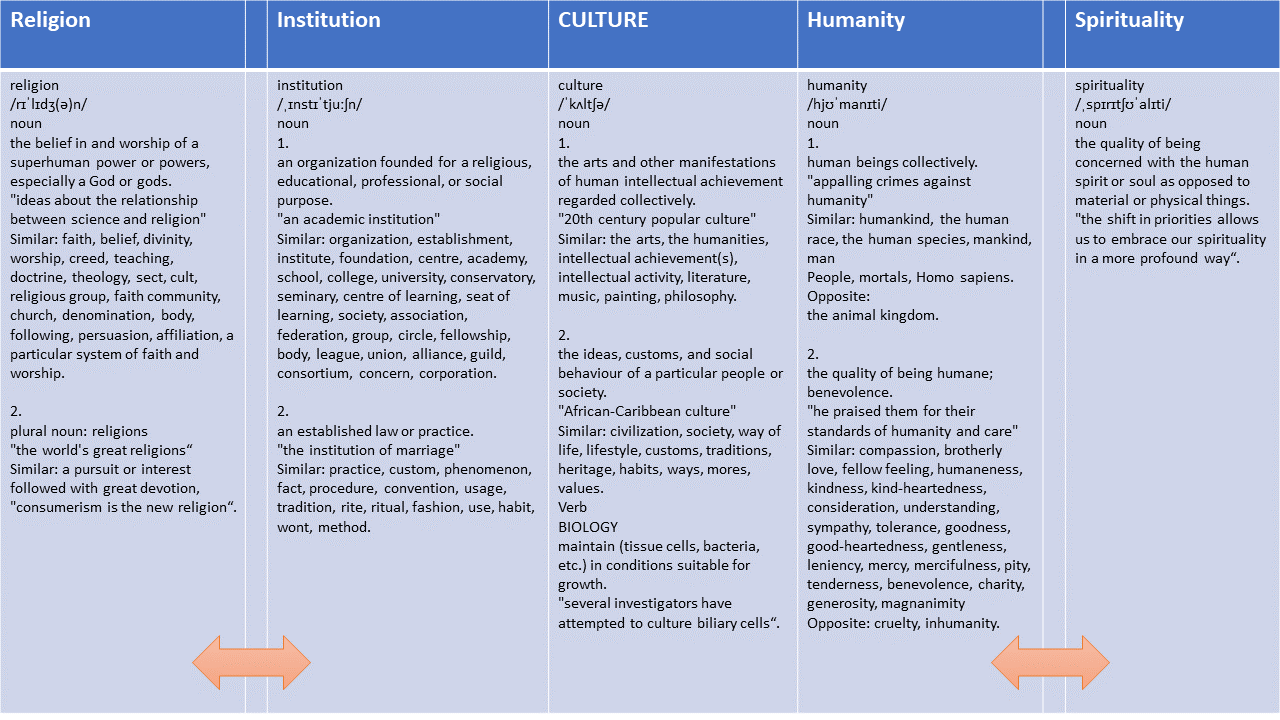
Slide 8. Local-Regional-Global Diagram
The misunderstandings noted also speaks to the context of Globalization, Localism and Transnationalism, producing what the author calls the “Local-Regional-Global Dynamic”. The British sociologist Roland Robertson (1994: 33–52) popularised the term ‘glocalization’, meaning a general cultural sphere by positing the interdependence of local and global processes in the formation of collective identities and symbolic interactions. Whereas the urban was known as city-states in ancient times, states are now known as either regional or global. City-states developed into municipalities during the late medieval ages, giving rise to the European renaissance. Cities are both local and regional. Our life-experience, lebens-philosophie, is a condition of all three: local, regional, global outlooks synthesised as a person’s worldview.
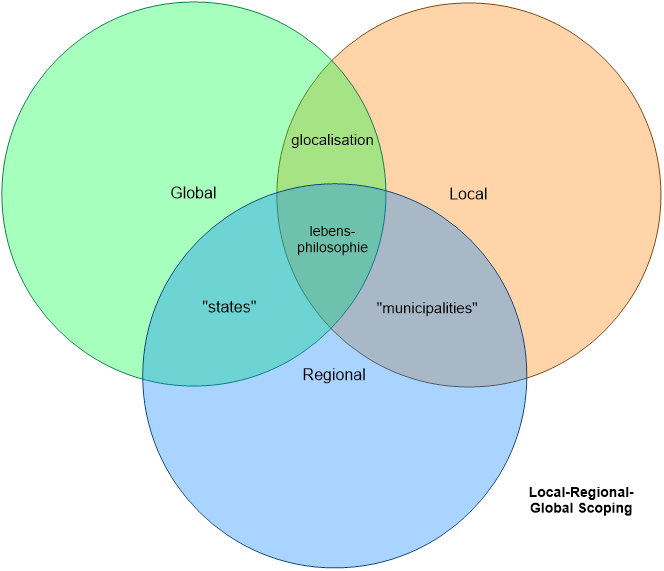
Slide 9. Local-Regional-Global Matrix
The terms, ‘local’, ‘regional’, ‘global’ are merely the descriptions of three types of scopings in the rhetoric or thinking. The relationships are, in different contexts, overlapping, cross-overing, paralleling, and emerging, depending on the activity of the language. The characteristics of the relationships include power, but the language is rich in the description of how we each relate to one another. Institutions and organisations are each better at some characteristics than others. The State needs public interest, as do universities, whereas municipalities continue on without much attention from its residents, until a moment of crisis. There is attitude of expertise shown to the State and municipalities. Each state governance has similarity in goals, what we refer to as policies. Communities, on the other hand, generally, work from harmonious relationships. Community still has structure in that cooperation, which is generally shared with municipalities; until there is a crisis. Municipalities tend to be blindsided in the talk of systematic strategy and quality. Universities have moved in the same direction, but the traditional model for the universities are ideas and practice of perseverance, passion for learning, and opportunities for improving the world. Surprising to some, universities and their local communities share in the values and ethics. Taken altogether, the characteristics provides each person with a worldview in the learning environment.

Image: Local-Regional-Global Matrix
Slide 10. Unitarian-Universalist Diagram
The problem in the academic mindset is its calculating disposition is not relevant to understanding the Universal Mind. It cannot be cut-up into segments of certain percentage. The diagram here (below) is place as the reductio ad absurdum. Outside of mathematics, truths cannot be calculated. Academic narrowness comes from the lack of exposure to Lebensphilosophie. The interdisciplinary discussions between history, philosophy, and sociology are the ‘Synoptic Vision’.
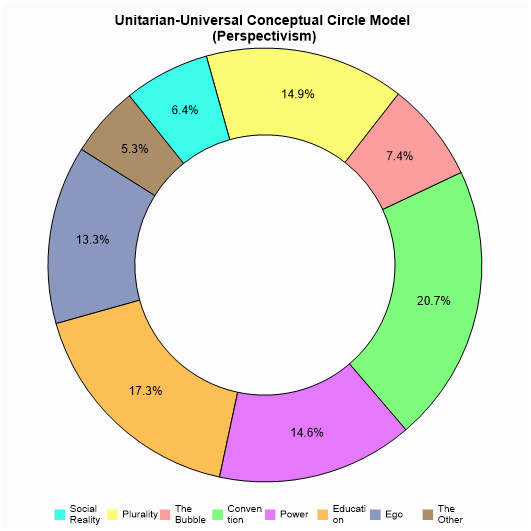
Image: Unitarian-Universal Conceptual Circle
In both religious and secular communities, there is the paradigm of Unitarian-Universalism, which is a movement in thought from Sociology of Knowledge to Sociology of Ideology and Networks (Buch 2017).
Slide 11. Neville Buch’s Philosophy and History
For the sociologist to understand this truth fully, the relationships between categories of Myth, History, and Philosophy have to be explored. Instead of the calculating circle, the process of historical time operates as a model spiral. This is a spiral which begins in the analytic tradition but ends up in the continental. From the grand claims of knowledge to being. The concepts of unity and the universal is a step along the way in thinking matters through, even as we tend to make those concepts the Absolute. However, the reference to unity and the universal is a claim for the method of scoping in and out.

Image: Neville Buch’s Philosophy and History Spiral of Time (the link explains)
Slide 12. Categories in Studies-in-Religion
The discipline of Studies-in-Religion has also aided the change in thinking of the last half-century. European, Anglo, and American philosophers have create a new spiritual learning environment, which some might call religion. There are four broad scoped schools, each with a different model, and includes 14 academic schools of thought. There is a theoretical enculturation model from the Continental tradition and transferred to the United States after World War II. It began in the General Theory with the British schools taken up the continental development. The European experience also included German and French existentialism, which was reworked in Anglo-American pastoral care theories. The political dimension was expressed also in the European theological development of neo-orthodoxy. The Americans reworked the thinking into political realism. This “neo-orthodox” model is now the American mainstream ‘evangelical’ stream. With the emphasis on good news, and living the good life, it has been coopted into the American cultural concept of wealth. Sociologically, the thinking is translated into a priority for a conventional ideal of material reality.
Phenomenology led to debates for ethical internalism and against ethical externalism. There could not be one cultural externality to demand any orthodoxy, and, thus, the cultural pluralism model. The process has come from the academic Left with academic forms of conceptual skepticism; a process shared with earlier existentialist system thinkers. The way to understand the Anglo-American movement of radical ethics and communitarian is, not only its connection to concepts of plurality and democracy, but also with the Moral and Modern Civilisation Model. In contrast to the model, this is the problem for the new type of hypo-conservatism which has existed in politics. The neo-conservativism renounced the moral foundational thinking of civilisation for the sake of “state rights”. In the view of neo-conservatists, the world has not fundamentally or functionally changed, and the historians and sociologists are the ones talking nonsense.
The Modern Civilisation Model is most articulated in contemporary humanism: Humanity has the priority over the State. One specific school is that of ideology and utopia, from Karl Mannheim and Paul Ricoeur in particular. It shares certain characteristics with the old definitional category of religion: visionary or messianic. However, since there is no need for orthodoxy and dogma in the outlook, the movement in studies-in-religion has been moving towards the concept of ‘spirituality’, the Lebensphilosophie of big belief and doubt.
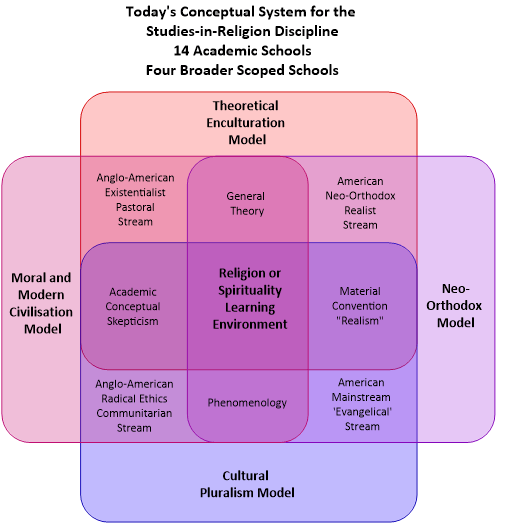
Image: Conceptual Systems for Studies-in-Religion (link explains)
Slide 13. The Sociology Of Municipal Politics Diagram
The “big picture” is more than the sociological modelling and considers the sociology input as a fit in larger interdisciplinary discourses. This is the role of the Southern Brisbane Suburban Forum Inc., which has been operated, for the last few years, as a local group of engineers, government bureaucrats, community development workers, and a sociological-philosophic historian as President (the author). One of the major issues of the Forum has been a battle of the business consultancy, Dr Neville Buch ABN: 86703686642, for the last five years (Buch 2018 b, c). It is a battle where the current political administration of Council has demonstrated both 1) poor historical knowledge of the city, including the history of the Council itself, and 2) poor understanding of the principles and global practices of local heritage. It might be counter-argued (politically) that this is just a generic problem of any council outlook. However, the opposition Councillors in the Brisbane City Council do take a different approach, educated by both the Southern Brisbane Suburban Forum Inc., and the Brisbane Southside History Network.
Community research and education of the Forum and Network is local public service (Buch 2022). The recent climax for the Forum and Network has been challenging the intellectual competence of the Brisbane Lord Mayor on the city’s social and historical questions (Buch 2023a); communication directly to the Mayor. As indicated at the end of the previous paragraph, the expectations of the Mayor and the Council is not utopian. There have been, in the recent history of Council, Lord Mayors highly intelligent on social and historical questions: Sallyanne Atkinson (Atkinson 2016), Jim Soorley (Soorley 1993), and Tim Quinn (Quinn, et al, 2014). After a long period of conventional Council governance, the place of local culture returned with Sallyanne Atkinson (in office 1985-1991) as one of the most intelligent Lord Mayors and the first and only female Lord Mayor of Brisbane. A history graduate, Sallyanne was a good friend to several members of the Department of History at the University of Queensland during her tenure. As an intellectual, the former priest, Lord Mayor Jim Soorley (1991-2003), made “a shift from Brisbane Council being only concerned with ‘rates, roads, rubbish’ to taking on issues such as drug use, homelessness, domestic violence and social justice.” Tim Quinn (2003-2004) followed Soorley’s direction with Urban Renewal being an important intellectual theme, and that connected with the sociology of urban gentrification for the inner-city.
Quinn is today a local history leader on the Brisbane southside. In this work the academy has been significantly absent. At the 2021 Australian Political Studies Association Conference, the author argued the promises of the 1990s local studies field collapsed before the historiographical challenges in the history wars of the Prime Ministership of John Howard, and escalated into the cultural war of the Trump era (Buch 2021b). The argument was recently developed at the Australian Historical Association Conference (Buch 2023a; Australian Catholic University).
The late John Laverty contributed to the intellectual critique of the Brisbane City Council through a very detailed examination of the pre-1925 Brisbane Municipal Council (1859-1902). It seems some of that legacy has continued and some obstructed. The reading of the histories is very mixed. Examining the Council minutes, from 1925 to 1937, there are no references to concepts of the urban, community, nor educational interests, except for rate and tariff exemptions or reductions for educational institutions and applications to show educational films in council-owned halls. Hence, the Council was able to have control over educational processes without making contributions to municipal education. The Local Authorities Association of Queensland was active in the interchange with the Council from 1925. Delegates were appointed from the conference to attend the Association. Competing with those agendas of the association was the Local Government Clerks’ Association (later, Municipal Officers’ Association) and the Local Producers’ Association. The policy of preference for locally manufactured articles for municipal use was there from 1925, but the challenge has been the opportunity for corrupt practices of favourism. In the last quarter of the century the Council did become globally conscious, but again the intellectual outlook was very mixed. The objections from Council when faced with large cultural proposals has centred around an odd argument that education has nothing to do with the affairs of Council.
In contrast to the Brisbane universities and the Council, there are the community organisations. The local history organisations in Brisbane are often led by the Brisbane History Group Inc., and the Royal Historical Society of the Queensland, but the intellectual landscape is also made up of the Brisbane Southside History Network with 16 groups south of the river, and 17 groups on the unnetworked northside. There is a great gap between the Council’s, with the general public’s, understanding of local history, and against the municipal knowledge of local history organisations. Few local sites, though, were thinking through the sociological schemas in terms of the misinformation in the outlook of localism. Local Aboriginal history and sociology has done better, of which Burke, et. al. (2020) is particularly notable.
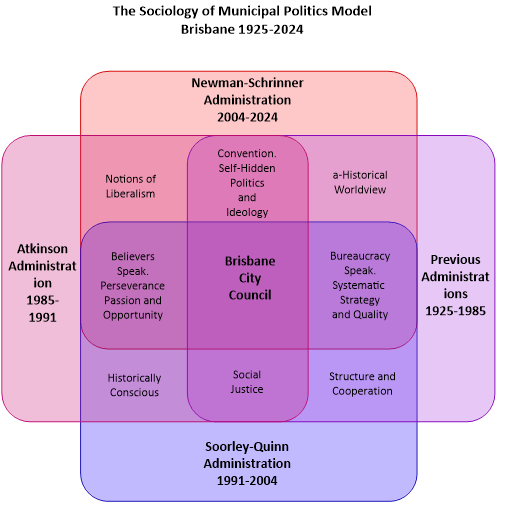
Image: Brisbane City Council Sociology 1925-2024
The local scholarship draws on the global literature, according to different communities, and thus different types of local communities are considering different insights, which unfortunately often does not get to the interdisciplinary scoping. For the local philosophy communities (e.g., The Philosophy Cafe Brisbane Meet Up run by the author), there is a greater understanding of concepts and practices in politics and local conflicts. (e.g., in Rancière 1999). For the local education communities, it is a question of Civic Education (de Jong 2020). Communities of local history and geography are informed on the relationships between social theories and spatiality (e.g., in Gregory 1991). Since the end of the 1980s, locally and globally, those insights became hidden histories in the geography discipline (Howitt 2007). That ignorance was generated deliberately and politically as universities faced decisions to no longer teach increasing small-enrolled sub-fields of contested knowledge, due to funding policies. This has meant an increasing population of university graduates without a wider education in the most update understanding of their society. Such understandings are a threat to governing parties when it has the potential for more forceful opposition. It is for this reason that local ecological communities are struggling. Swyngedouw (2009) speaks of the “antinomies of the postpolitical city”. The challenge for the City is whether the understanding can be resolved as a reasonable and practical solution or whether the ‘postpolitical’ rhetoric will simply cancel out a healthy political and local culture(s). The local, educated, political communities well understand all of these dynamics of knowledge construction. The global literature of the last 30 years which has been locally informative is very large, which is then bewildering on the existence of local, uneducated, political communities; something wilfully unintelligent. Local and global readers – if willing – can see the City as contested space or landscape (Duncan 1990). The relationship between political culture and public sphere has become more apparent (Somers 1995). Populist postmodernist rhetoric has been turned against actual democratic processes (Rogers 2004). By the end of the last decade, arguments on, about, and against populism and localism was well-established (e.g., in Griggs and Howarth 2008). Of the last decade and some, the major themes have been contention, polarisation, and culture war (Mitchell, Attoh and Staeheli 2015; Muste 2014).
Slide 14. Theory
Sociologists, as a general truism, believe that any governance too long in power become corrupt, lose integrity, and generally end up with no effective vision for the future. Change eventually comes but the nature of the change is unknown.
The Conviviality Theme speaks of ‘Social Power’ which has shifted from the academy to outside communities.
These basic ideas draw together the pragmaticism of Mead, John Dewey, and other sociologists, such as C. Wright Mills and his 1956 book: The Power Elite, as well as the hermeneutic philosophy of Charles Taylor and Paul Ricoeur. What brings this interdisciplinary ‘fit’ together is the importance of Language and Power as both structure and persons. This is an understanding for the locality, as much as for the world.

Image: Sociological Power and Theory Mapping (the link explains)
There is in indigenous perspectives a good understanding of misleading fear and conflict narratives. Among the non-indigenous population, local scholars (Caulfield and Wanna 1995; Davis 1995), in the mid-1990s, were developing applied theories in the perspectives of power and community which laid down the groundwork of the urban sociology for this paper. More recently, local scholars have been turning to the concept of social representations in Brisbane newspapers (Raynor, Matthews, and Mayere 2017). In all of these works are debates on urban consolidation. This is where the politics enters; with the need to have a singular messaging in the public relations (“PR”) rhetoric. However, Lebensphilosophie – actual lived experience in the City – is nothing like the messaging. The recent movement towards the March 2024 Brisbane City Council elections is bearing out the oppositional argument with Green’s candidate for Mayor, Jonathan Sriranganathan, in the running (Sullivan 2022). Nicole Johnston, independent Councillor for Tennyson, is also a representative of the better urban sociology outlook. That outlook is the Synoptic Vision.
Slide 15. A Persons’ Worldviews
There are three points to be made on municipal governance in Brisbane. The first point is to understand the semantics of ‘common sense’ judgements: it is not necessarily ‘common’ nor ‘sense’ to the populace. Scholarship, not populist or academic politics, is what matters. The second point is the interdisciplinary approach that Kleidman (2006: 68-82) seeks to design for sociology research: creating synergies between professional and engaged social science. The third point comes out of my interdisciplinary research on the works of European and American modernism: in particular, applied philosophers Charles Taylor and Paul Ricoeur, and sociologist George Herbert Mead. The thinkers are indebted to Hegel and basic idealism which, contra the positivistic critical claims, have always girted the disciplines of history, social geography, and sociology.
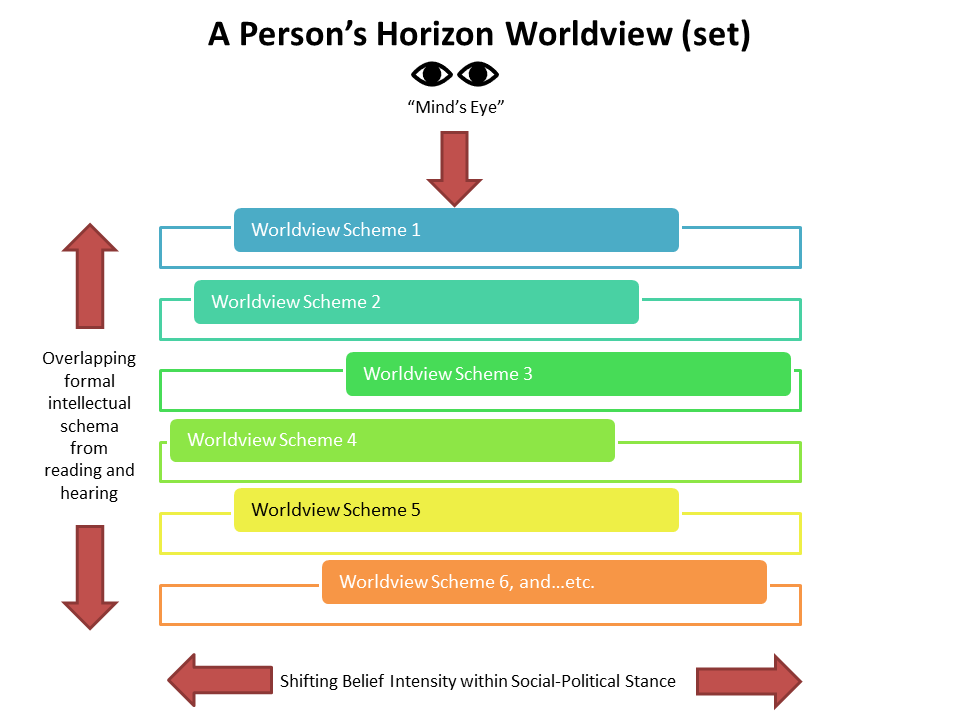
Image: Mind’s Eye of a Personal Horizon Worldview (link explains)
Slide 16. Deepen Understanding
The intellectual outlook of the city’s residents shapes policies in the urban sociology, and, as such, is a way forward: to 1) understand the semantics of ‘common sense’ judgements; 2) adopt the interdisciplinary approach; and 3) take seriously the sociologically-interpreted European-Anglo-American histories in describing our current modernism(s). This is our compatibilist progressivism for suburban sustainable living.
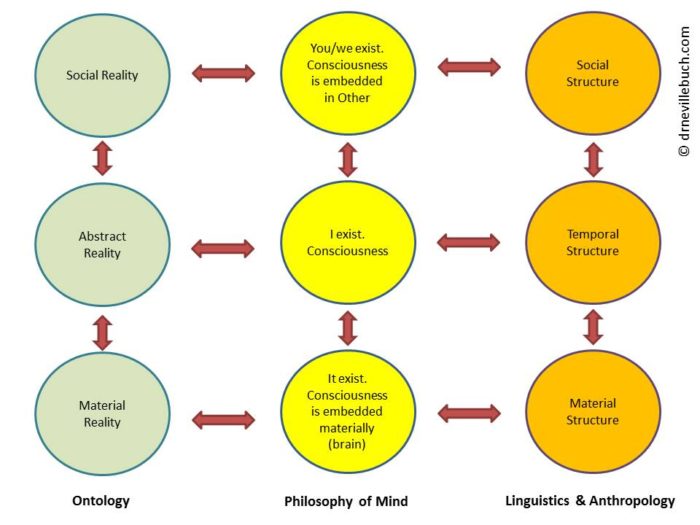
Image: The Interdisciplinary Model: Interrelation-of-Ideas-on-Consciousness-and-Reality (link explains)

BIBLIOGRAPHY
2022 Glasgow Declaration of Modern Humanism
Atkinson, Sallyanne (2016). No job for a woman, St Lucia, Queensland : University of Queensland Press.
Avant, Gayle (1975). Review of Tools for Conviviality by Ivan Illich, The American Political Science Review, 69(3), 999-1000.
Banks, J. A. (1989). From Universal History to Historical Sociology, The British Journal of Sociology, 40(4), 521–543. https://doi.org/10.2307/590887
Buch, Neville (1995). American Influence on Protestantism in Queensland since 1945, Ph.D. thesis, Department of History, University of Queensland, August 1994, Awarded April 1995.
Buch, Neville (2017). Historical Sociology Thesis, academia.edu .
Buch, Neville (2018a). Small is Big: Scaling the Map for Brisbane Persons and Institutions 1825-2000. ‘The Scale of History’ AHA Conference, Australian National University, 4 July 2018.
Buch, Neville (2018b). Looking to the Future for the Past Business Case, , Dr Neville Buch ABN: 86703686642.
Buch, Neville (2018c). NDB-TWIM-BP Concept Plan for Brisbane City Council, Dr Neville Buch ABN: 86703686642.
Buch, Neville (2019). Mapping Local Educated Society 1859-2009: Landscape and Culture in the Mapping Brisbane Education Project, Port Macquarie Campus, Charles Stuart University, 21 November 2019.
Buch, Neville (2021a). Melbourne, Brisbane Southside, and Urban Development, Dr Neville Buch ABN: 86703686642 (https://drnevillebuch.com/melbourne-brisbane-southside-and-urban-development/).
Buch, Neville (2021b). Politics in the Age of Uncertainty: Anti-intellectualism, Expertise, and the Technological Agenda in Queensland Politics, 1911-2011, a paper of local-regional relevance, Australian Political Studies Association Annual Conference, 21 September 2021.
Buch, Neville (2022). History and Practice of Community Education No. 1., Dr Neville Buch ABN: 86703686642.
Buch, Neville (2023a). Whither Local History Paper, Australian Historical Association, Melbourne, Australian Catholic University.
Buch, Neville (2023b). SBSF Submission as Feedback on Kurilpa Sustainable Growth Precinct, Southern Brisbane Suburban Forum Inc., and Dr Neville Buch ABN: 86703686642.
Burke, H., Kerkhove, R., Wallis, L. A., Keys, C., & Barker, B. (2020). Nervous nation: Fear, conflict and narratives of fortified domestic architecture on the Queensland frontier, Aboriginal History, 44, 21–58. https://www.jstor.org/stable/27018598
Caulfield, Janice and John Wanna, (1995). Power and community: theoretical approaches, Power and Politics in the City: Brisbane in Transition, 1-17,280-302.
Cook, M. (2017). Vacating the Floodplain: Urban Property, Engineering, and Floods in Brisbane (1974-2011). Conservation and Society, 15(3), 344–354. http://www.jstor.org/stable/26393302
Cook, Margaret (2019). A River with a City Problem: A History of Brisbane Floods, University of Queensland Press.
Davis, Glyn (1995). Power and politics in the city: conclusion, Power and Politics in the City: Brisbane in Transition, 267-279,280-302.
de Jong, W. (2020). Civic Education and Contested Democracy: Towards a Pedagogic State in the Netherlands Post 1945, Palgrave.
Duncan, J. (1990). The City as Text: The Politics of Landscape Interpretation in the Kandyan Kingdom, Cambridge University Press.
Gibilisco, Peter (2023). Our mutual obligations in a mutually dependent society, John Menadue’s Public Policy Journal, 18 October 2023.
Finlayson, Laura (2023). The sycophant, Pearls and Irritations: John Menadue’s Public Policy Journal, Republished from the Newleftreview.org, 21 September 2023. (https://johnmenadue.com/the-sycophant/)
Fisher, Rod and Barry Shaw (edited, 2010). Brisbane: Houses, Gardens, Suburbs and Congregations, Papers of Brisbane History Group (22), 197-214, 296-298, 304-311.
Frauley, Jon (2017). Synoptic Vision, The Canadian Journal of Sociology / Cahiers canadiens de sociologie , 42(3), 293-324.
Fuhrman, Susan H. and Richard F. Elmore (1990). Understanding Local Control
Furedi, Frank (2023) Power Play: who really rules today, Roots & Wings email newsletter, 28 October 2023.
Galuszka, J. (2019). What makes urban governance co-productive? Contradictions in the current debate on co-production. Planning Theory, 18(1), 143–160. https://www.jstor.org/stable/26677440
Gregory, Derek (1991). Interventions in the Historical Geography of Modernity: Social Theory, and the Politics of Representation, Geografiska Annaler (Swedish Society for Anthropology and Geography), Series B, Human Geography, 73(1), 17–44. www.jstor.org/stable/490924.
Griggs, S. and Howarth, D. (2008). Populism, Localism and Environmental Politics: The Logic and Rhetoric of the Stop Stansted Expansion Campaign, Planning Theory, 7(2), 123–144. http://www.jstor.org/stable/26004248
Gunn, S. (2004). Class, identity and the urban: the middle class in England, c.1790-1950, Urban History, 31(1), 29–47. http://www.jstor.org/stable/44613439
Howitt, Richard (2007). Hidden histories in geography : a politics of inclusion and participation, Gender, Place and Culture – A Journal of Feminist Geography, 14(1), 51-56.
Kanaris, Jim (2023). Toward a Philosophy of Religious Studies: Enecstatic Explorations, SUNY Press.
Kleidman, Robert (2006). “Public Sociology, Engaged Scholarship, and Community Organizing,” Journal of Applied Sociology, 23(1), 68–82. www.jstor.org/stable/43736125.
Lawson, Ronald (1980) Towards Demythologizing the “Australian Legend”: Turner’s Frontier Thesis and the Australian Experience, Journal of Social History, 13 (4), 577-587.
Lea, Gary R. (2020). Constructivism and its risks in artificial intelligence, Prometheus, 36(4), 322-346.
Lee, G., Marriot, M., & Jones, C. F. (2009). Brisbane Foreshore Parklands. Landscape Architecture Australia, 123, 58–63. http://www.jstor.org/stable/45141435
Lesh, James (2023). Values in Cities: Urban Heritage in Twentieth-Century Australia, Routledge.
Megill, Allan (2009). The Needed Centrality of Regional History, academia.edu .
Mišina, Dalibor (2015). Who Now Needs Sociology? Transdisciplinarity Vs. Tradition, The Canadian Journal of Sociology / Cahiers Canadiens De Sociologie, 40(4), 527–546. www.jstor.org/stable/canajsocicahican.40.4.527.
Mitchell, D., Attoh K. and Staeheli L. (2015). Whose city? What politics? Contentious and noncontentious spaces on Colorado’s Front Range, Urban Studies, 52: 2633–2648.
Mullins, P and University of Queensland. Department of Anthropology and Sociology Brisbane Northern Freeway impact study : social consequences. Special report no. 2, Social implications of the Brisbane Northern Freeway. the Dept, St Lucia, 1976.
Mullins, P and University of Queensland. Department of Anthropology and Sociology Brisbane Northern Freeway impact study : social consequences. Special report no. 4, Network structure and political mobilisation : the case of a Brisbane urban social movement. the Dept, St Lucia, 1976.
Mullins, Patrick & University of Queensland. Dept. of Sociology and Anthropology (1976). Residents and the Brisbane northern freeway: the pre-location situation. Dept. of Anthropology and Sociology, University of Queensland.
Mullins, Patrick (1979). The Struggle against Brisbane’s Freeways, 1966-1974: An Australian Case Study of Urban Development, Residential Life and Urban Politics, Department of Anthropology and Sociology, University of Queensland, Ph.D. Thesis
Mullins, Patrick (1979). Women and the struggle against Brisbane’s freeways, Australian and New Zealand Journal of Sociology. 15 (Mar 1979), 43-49.
Mullins, Patrick & West, Mark (1998). Windsor twenty-five years on: the continuing presence of a 1970s freeway plan in inner Brisbane, Urban Policy and Research. 16 (3), 199-210.
Muste, C. P. (2014). Reframing Polarization: Social Groups and “Culture Wars”, PS: Political Science and Politics, 47(2), 432–442. http://www.jstor.org/stable/43284567
Nicholls, D. (1985). The English Middle Class and the Ideological Significance of Radicalism, 1760-1886, Journal of British Studies, 24(4), 415–433. http://www.jstor.org/stable/175474
Ormerod, E., & MacLeod, G. (2019). Beyond consensus and conflict in housing governance: Returning to the local state. Planning Theory, 18(3), 319–338. https://www.jstor.org/stable/26759191
Perry, B. (2011). Universities and Cities: Governance, Institutions and Mediation. Built Environment, 37(3), 244–259. http://www.jstor.org/stable/23290044
Piovani, Juan (2023). The Idea of Conviviality and Its Methodological Implications, 2023 International Sociology Association (ISA) World Congress abstracts, Melbourne, Australia.
Quinn, Tim, et. al. (2014). Walking with the water rats : … Kurilpa Point to Davies Park and beyond, Department of Environment & West End Making History Group.
Rancière, J. (1999). Dis-Agreement: Politics and Philosophy. Minneapolis, MN: University of Minnesota Press.
Raynor, K., Matthews, T., & Mayere, S. (2017). Shaping urban consolidation debates: social representations in Brisbane newspaper media, Urban Studies, 54(6), 1519–1536. https://www.jstor.org/stable/26151428
Ritzer, George (1993). The McDonaldization of Society: an investigation into the changing character of contemporary social life, Pine Forge Press.
Robb, Arlene (2005). House on the Hill, House in the Valley: the influence of topography on Brisbane suburban fabric, The University of Queensland, School of Geography, Planning and Environment Management.
Robertson, Roland (1994). Globalization: Social Theory and Global Culture, Sage.
Robinson, G. M. (1994). Instant urban development: Brisbane’s South Bank Parklands. Geography, 79(3), 269–271. http://www.jstor.org/stable/40572581
Rogers, Melvin L. (2004). Rortys Straussianism Or Irony Against Democracy, Contemporary Pragmatism, 1(2), 95-121.
Schmidt, T. (1998). An Environment Behaviour Approach to Public Space Design: The Study of Two Urban Spaces in Brisbane. Landscape Australia, 20(3 (79), 240–245. http://www.jstor.org/stable/45144522
Searle, G., & Bunker, R. (2010). Metropolitan strategic planning: An Australian paradigm? Planning Theory, 9(3), 163–180. http://www.jstor.org/stable/26004259
Sellars, Wilfrid (1963, 2017). Science, Perception and Reality, Ridgeview Publishing Company.
Sharma, P. C (1986). Brisbane: some aspects of its social geography, Queensland Geographical Journal Surveys, 272-295.
Somers, Margaret R. (1995). What’s Political or Cultural about Political Culture and the Public Sphere? Toward an Historical Sociology of Concept Formation, Sociological Theory, 13(2), 113–144. www.jstor.org/stable/202157.
Soorley, Jim (1993)., Griffith University. Institute for Cultural Policy Studies and City Cultures Conference (1992 : Brisbane). The body, mind and spirit of the city : towards cultural planning. Institute for Cultural Policy Studies, Faculty of Humanities, Griffith University, Nathan, Qld.
Steger, Manfred B. and Paul James (2015). Globalization Matters: Engaging the Global in Unsettled Times, Cambridge University Press.
Sullivan, Zach (2022). Student film documentary – -Jonno- – YouTube. (https://www.youtube.com/watch?v=tj-YCAVz9Yc)
Sushinsky, J. R., Rhodes, J. R., Shanahan, D. F., Possingham, H. P., & Fuller, R. A. (2017). Maintaining experiences of nature as a city grows. Ecology and Society, 22(3). http://www.jstor.org/stable/26270160
Swyngedouw, E. (2009). The antinomies of the postpolitical city: In search of a democratic politics of environmental production, International Journal of Urban and Regional Studies, 33: 601–620.
Taborda, C., & Bennetts, P. (2020). A paradoxical nature: Roma Street Parkland. Landscape Architecture Australia, 165, 40–41. https://www.jstor.org/stable/48564024
Takeifanga, Toa K. (1996). The middle classes and the gentrification of Inner Brisbane. The University of Queensland, School of Social Science, Master’s Thesis.
Temby, Anna (2024). Governance and Public Space in the Australian City: Negotiating Public Order in Brisbane, 1875–1914, Routledge.
Vanderby, Nikita, et al (2023). Making Public Histories. Australian History Beyond the University, Council of Australian University Librarians Open Educational Resources Collective.
Walters, P., & McCrea, R. (2014). Early Gentrification and the Public Realm: A Case Study of West End in Brisbane, Australia, Urban Studies, 51(2), 355–370. http://www.jstor.org/stable/26145720
Woodward, Ian (2003). Divergent narratives in the imagining of the home amongst middle-class consumers: aesthetics, comfort and the symbolic boundaries of self and home, Journal of Sociology, 39 (4), 391(22).
Featured Image: A road sign with the word hope ahead with rainbow and clouds in the background. 22268416 © Valentin M Armianu, Dreamstime.com

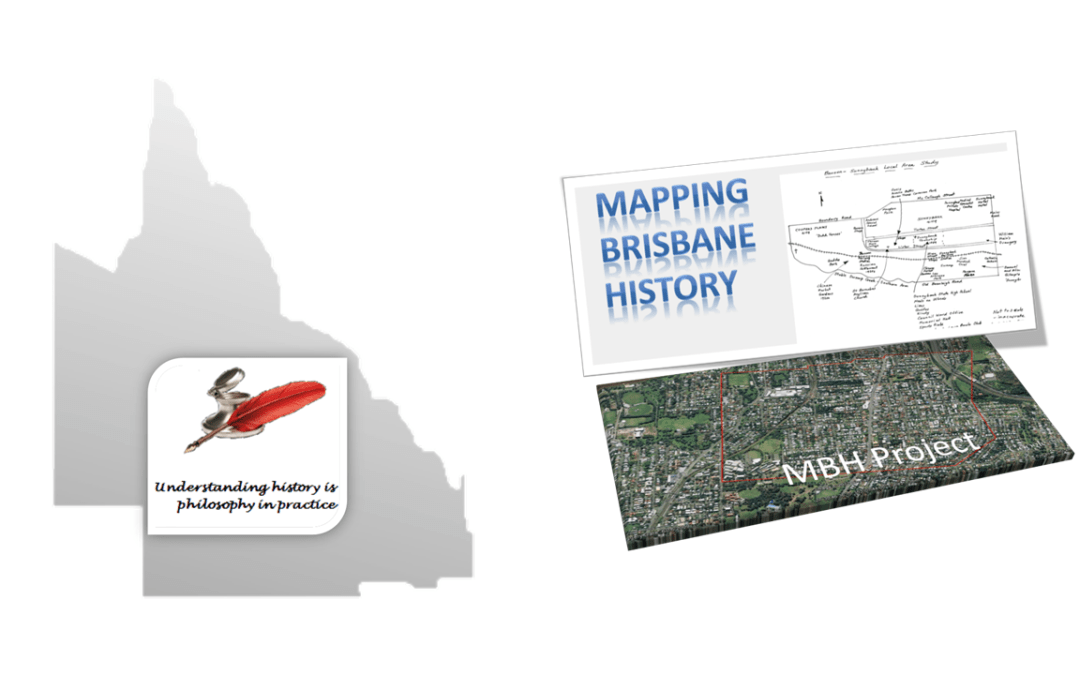
by Neville Buch | Aug 28, 2023 | Concepts in Public History for Marketplace Dialogue, Mapping Brisbane History, Publication
28 August 2023
Hon. Steven Miles
Minister, State Development
PO Box 15009
City East, QLD 4002
RE: The Gabba and Raymond Park Re-development
Dear Premier, Deputy Premier, and the Queensland Cabinet,
I am writing to you, for the senior members of the Queensland Government, to make a personable plea after listening to this 12-minute film, Rethink TheGabba…
https://www.youtube.com/watch?v=lI56FbuPaIE&t=1s
In Jim Stevens’ evocative film, delve deep into the struggles of the community most impacted by the Gabba redevelopment. As the government railroads a plan causing significant disruption to the local fabric, hear firsthand from East Brisbane State School parents, Raymond Park residents, and local businesses. Their voices resonate with resilience, unity, and a clear message: this fight isn’t over.
Donate: https://chuffed.org/project/z6blr2q0nljy
Learn more: https://www.rethinkthegabba.org/
Rethink TheGabba
…as well as making three submissions to the Queensland Government in my role as President, The Southern Brisbane Suburban Forum Inc (SBSF). My personal plea is for senior members of the Queensland Government to come to their senses. What I mean is Queensland Government senior members need to understand that their policy position on urban development is flawed, and I do not mean flawed at the side, I mean fundamentally flawed at its heart, such that the educationalists, sociologists, historians, and philosophers can see the stupidity in your policy position.[1] I do not say that word lightly. When governments become so ethically ‘criminal’ – not in the allowance of law, but by arrogant behaviour – that it cannot hear and accept the truth in the voluminous voice of the communities raged against it, it cannot be anything but intellectually stupidity (cognitive corruption).
The Gabba and Kangaroo Point Community has the wide and full backing of Southern Brisbane in their outrage against this governmental stupidity, in the very least. Furthermore, if every member of Brisbane, and Queensland, thought in the tight critical thinking form of Communicative rationality (Habermas, 1979)[2], they would have to, each, agree that Government members are not thinking in the best form of rationality, and even worse, not representing the people of Queensland intelligently.
I make this plea not as a person who does not know what they are talking about, as powerful decision-makers are so prone to be arrogantly dismissive. And I remind you that you have dismissed the advice of your own departments on this issue of urban development. I personally have had a career of more than 30 years[3] in urban sociology, urban philosophy, and urban histories.[4] I have seen governments in ruin, come and go in such arrogance, during that time…
…My plea is that each senior member of the government to come to their sense. Abandon your current policy position and current planning on the 2032 Olympic Games re-development. You do not even have the public support of the Australian Olympic Committee chief executive, Matt Carroll.[5]
Yours sincerely
Neville Buch
Historian, MPHA (Qld), Ph.D. (History) UQ., Grad. Dip. Arts (Philosophy) Melb., Grad. Dip. (Education) UQ.

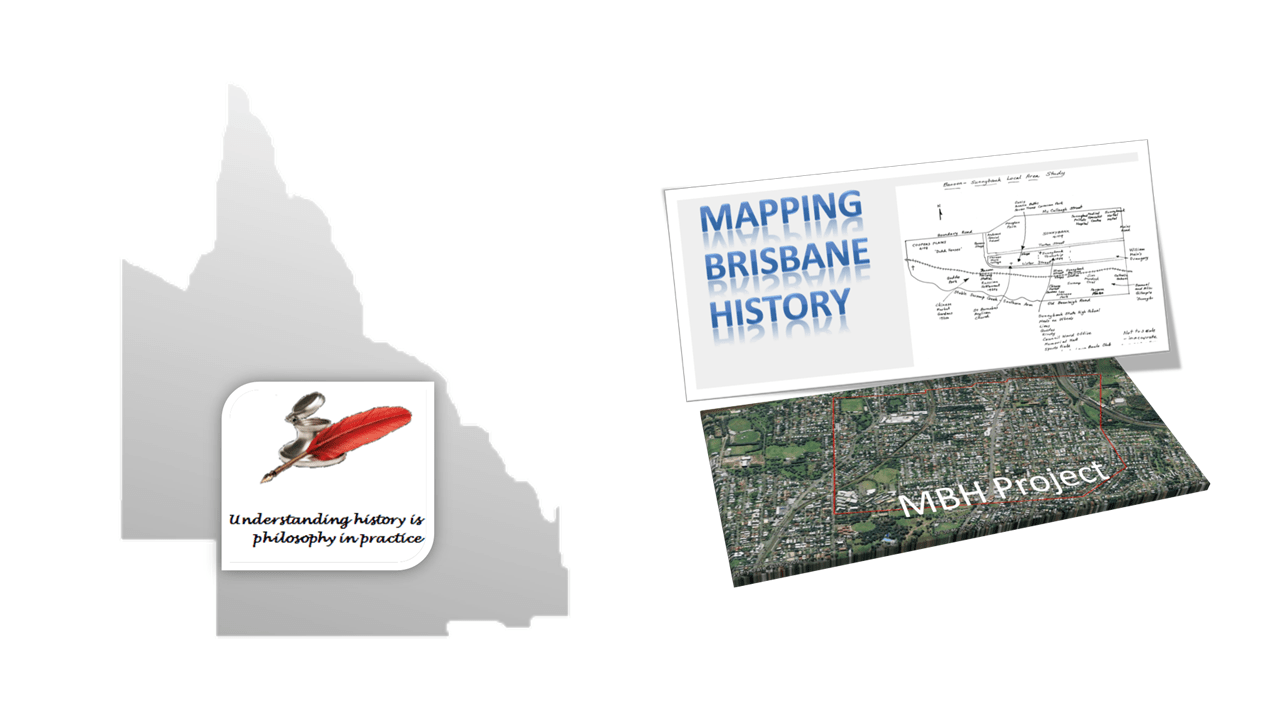
References
[1] Clear evidence of the educationalists, sociologists, historians, and philosophers seeing the stupidity in current Queensland government policy positioning by demonstrating the reasoning in the following, from G. H. Smith’s The Theory of the State (1895) to my own work over the last decade (selected publications):
Aronovici, C. (1920). Americanization: Its Meaning and Function. American Journal of Sociology, 25(6), 695–730. http://www.jstor.org/stable/2764130
Barnes, H. E. (1917). Sociology Before Comte: A Summary of Doctrines and an Introduction to the Literature. American Journal of Sociology, 23(2), 174–247. http://www.jstor.org/stable/2763534
Barnes, H. E. (1919). Two Representative Contributions of Sociology to Political Theory: The Doctrines of William Graham Sumner and Lester Frank Ward. American Journal of Sociology, 25(2), 150–170. http://www.jstor.org/stable/2763558
Buch, Neville (2012), Co-authored with Dr Jonathan Richards. Reports on the Pre-Released 1982 Queensland Cabinet Minutes. Queensland State Archives. November 2012.
Buch, Neville (2015). Under the Skin — Human Passion & Reason in War & Peace. Q ANZAC 100 Fellows Event. State Library of Queensland. 8 September 2015.
Buch, Neville (2018). Small is Big: Scaling the Map for Brisbane Persons and Institutions 1825-2000. ‘The Scale of History’ AHA Conference, Australian National University, 4 July 2018
Buch, Neville (2019). “A prophet is without honour only in his hometown, among his relatives, and in his own household”: Local History and Global Learning – A Historical Mapping of Brisbane Thinkers and Their Local Environment 1859-1959. Local Communities, Global Networks Conference. Australian Historical Association Conference, University of Southern Queensland, 11 July 2019.
Buch, Neville (2019). The Australian Literary Setting of the ‘Queensland Character’ and Mid-Twentieth Century Philosophy: The Philosophical Development of Jack McKinney and the Problem of Knowledge 1935-1975. Revolutions & Evolutions in Intellectual History Conference. International Society for Intellectual History, University of Queensland, 6 June 2019.
Buch, Neville (2019). Before and After 1989: The Conceptual Schemas, Christian Education, and Queensland Society. ACHEA Conference, State Library of Queensland, 1 August 2019.
Buch, Neville (2019).Mapping Local Educated Society 1859-2009: Landscape and Culture in the Mapping Brisbane Education Project, Port Macquarie Campus, Charles Stuart University, 21 November 2019.
Buch, Neville (2021).Finding Peace from the Culture-History War: A Historiographical Message for the Times. Academia Letters, Article 1916. https://doi.org/10.20935/AL1916
Buch, Neville (2021).The Intellectual Ethos of Charles Strong in Queensland 1855-1917, in Marion Maddox, Charles Strong’s Australian Church: Christian Social Activism, 1885–1917, University of Melbourne Press
Buch, Neville (2021), with Kath Feeney, Afternoons, ABC Local (ABC Brisbane), 10 September 2021, 14 minutes. On myth and history of the Brisbane Southside-Northside divide, sides of the Brisbane River, suburbs, and the 11 Brisbane regions.
Buch, Neville (2021). Politics in the Age of Uncertainty: Anti-intellectualism, Expertise, and the Technological Agenda in Queensland Politics, 1911-2011, a paper of local-regional relevance, 2021 Australian Political Studies Association Annual Conference, 21 September 2021.
Buch, Neville (2021). Melbourne, Brisbane Southside, and Urban Development, Dr Neville Buch Website (ABN 86703686642), https://drnevillebuch.com/melbourne-brisbane-southside-and-urban-development/
Buch, Neville (2022). Public and applied history in the community education ‘classroom’: The Brisbane Global Experience, Centre for Applied History (CAH) and Tertiary History Educators Association (THEA), Macquarie City Campus, Sydney, 24 June 2022.
Buch, Neville (2022). What Does It Mean for Brisbane as a City? , Dr Neville Buch Website (ABN 86703686642), https://drnevillebuch.com/what-does-it-mean-for-brisbane-as-a-city/
Buch, Neville (2022). Has the History and Philosophy Schools lost it in the New World of Online Learning and Community Education? Dr Neville Buch Website (ABN 86703686642), https://drnevillebuch.com/has-the-history-and-philosophy-schools-loss-it-in-the-new-world-of-online-learning-and-community-education/
Buch, Neville (2022). Acknowledgement of contact to the Lord Mayor: We demand multi-governmental solutions delivered, Dr Neville Buch Website (ABN 86703686642), https://drnevillebuch.com/acknowledgement-of-contact-to-the-lord-mayor-we-demand-multi-governmental-solutions-delivered/
Buch, Neville (2022). The Language and Ignorance of the Culture Warrior and Knowledge of Religion & Culture in Late 20th Century Queensland, Dr Neville Buch Website (ABN 86703686642), https://drnevillebuch.com/the-language-and-ignorance-of-the-culture-warrior-and-knowledge-of-religion-culture-in-late-20th-century-queensland/
Buch, Neville (2022). C. Wright Mills’ The Power Elite, the Old-New Left, and Queensland lived Ideologies, Dr Neville Buch Website (ABN 86703686642), https://drnevillebuch.com/c-wright-mills-the-power-elite-the-old-new-left-and-queensland-lived-ideologies/
Buch, Neville (2022). How are we learning? The Intellectual Failure of History and Heritage in Australian Capital Cities, Dr Neville Buch Website (ABN 86703686642), https://drnevillebuch.com/how-are-we-learning-the-intellectual-failure-of-history-and-heritage-in-australian-capital-cities/
Buch, Neville (2022). Regarding Our Education Systems Needing Thinking in Contemporaneous Compatibilist Epistemology, Dr Neville Buch Website (ABN 86703686642), https://drnevillebuch.com/regarding-our-education-systems-needing-thinking-in-contemporaneous-compatibilist-epistemology/
Buch, Neville (2022). Explaining Neville’s Historiography (Dr Neville Buch ABN 86703686642), Dr Neville Buch Website (ABN 86703686642), https://drnevillebuch.com/explaining-nevilles-historiography-dr-neville-buch-abn-86703686642/
Buch, Neville (2022). The United States Tour: American Educationalist Models in an Australian State 1942-2022, Dr Neville Buch Website (ABN 86703686642),
https://drnevillebuch.com/the-united-states-tour-american-educationalist-models-in-an-australian-state-1942-2022/
Buch, Neville (2023), with Kath Feeney, Afternoons, ABC Local (ABC Brisbane), 25 July 2023, 9.30 minutes. On naming Brisbane.
Buch, Neville (2023). Research Note: Anglo-American Major Belief-Doubt Systems, Dr Neville Buch Academia.edu, https://www.academia.edu/104984588/Research_Note_Anglo_American_Major_Belief_Doubt_Systems
Buch, Neville (2023). Persons, Ideology, and Cognitive Mapping, Dr Neville Buch Website (ABN 86703686642), https://drnevillebuch.com/persons-ideology-and-cognitive-mapping/
Buch, Neville (2023). 2023-04-05 Letter to Mayor. Re. Questions on 2023-2025 Commemorations, Dr Neville Buch Website (ABN 86703686642), https://drnevillebuch.com/2023-04-05-letter-to-mayor-re-questions-on-2023-2025-commemorations/
Buch, Neville (2023). Dr Neville Buch’s Philosophy and History, Dr Neville Buch Website (ABN 86703686642), https://drnevillebuch.com/dr-neville-buchs-philosophy-and-history/
Buch, Neville (2023). Stupidity of the Market Economy in Higher Education, Dr Neville Buch Website (ABN 86703686642), https://drnevillebuch.com/stupidity-of-the-market-economy-in-higher-education/
Buch, Neville (2023). Communication, Critical Thinking, Education, and Research: A Society Captured in the ‘PR’ Outlook, Dr Neville Buch Website (ABN 86703686642), https://drnevillebuch.com/communication-critical-thinking-education-and-research-a-society-captured-in-the-pr-outlook/
Buch, Neville (2023). Letter to the Queensland Government and Heritage Council, Dr Neville Buch Website (ABN 86703686642), https://drnevillebuch.com/letter-to-the-queensland-government-and-heritage-council/
Buch, Neville (2023). SBSF Submission as Feedback on Kurilpa Sustainable Growth Precinct, Dr Neville Buch Website (ABN 86703686642), https://drnevillebuch.com/sbsf-submission-as-feedback-on-kurilpa-sustainable-growth-precinct/
Buch, Neville (2023). Part Three: Urban Rebellion and Community Education, Dr Neville Buch Website (ABN 86703686642), https://drnevillebuch.com/part-three-urban-rebellion-and-community-education/
Buch, Neville (2023). The Southern Brisbane Suburban Forum Inc.’s Briefing-Submission on the State Government’s South East Queensland Regional Plan 2023 Update (SEQRP), Dr Neville Buch Website (ABN 86703686642), https://drnevillebuch.com/the-southern-brisbane-suburban-forum-inc-s-briefing-submission-on-the-state-governments-south-east-queensland-regional-plan-2023-update-seqrp/
Buch, Neville (2023). Conversation out in the community of the Southern Brisbane region, Dr Neville Buch Website (ABN 86703686642), https://drnevillebuch.com/conversation-out-in-the-community-of-the-southern-brisbane-region/
Campos, P. (2014). Candor and the Politics of Law Teaching. The Radical Teacher, 99, 27–33. https://www.jstor.org/stable/48694420
Condorcet, & Baker, K. M. (2004). Sketch for a Historical Picture of the Progress of the Human Mind: Tenth Epoch. Daedalus, 133(3), 65–82. http://www.jstor.org/stable/20027931
Davidson, T. (1901). The Task of the Twentieth Century. International Journal of Ethics, 12(1), 23–43. http://www.jstor.org/stable/2376218
Ford, H. J. (1903). The Results of Reform. The Annals of the American Academy of Political and Social Science, 21, 69–85. http://www.jstor.org/stable/1009915
Hayes, E. C. (1913). Social Values. American Journal of Sociology, 18(4), 470–508. http://www.jstor.org/stable/2763309
Kaplan, A. (1958). American Ethics and Public Policy. Daedalus, 87(2), 48–77. http://www.jstor.org/stable/20026439
Mecklin, J. M. (1918). The Tyranny of the Average Man. International Journal of Ethics, 28(2), 240–252. http://www.jstor.org/stable/2377539
Ross, E. A. (1919). Lumping Versus Individualization. International Journal of Ethics, 30(1), 58–67. http://www.jstor.org/stable/2377323
Ross, E. A. (1920). Ossification. American Journal of Sociology, 25(5), 529–538. http://www.jstor.org/stable/2764070
Sculos, B. W. (2019). It’s Capitalism, Stupid!: The Theoretical and Political Limitations of the Concept of Neoliberalism. Class, Race and Corporate Power, 7(2). https://www.jstor.org/stable/48645447
Sharp, F. C. (1899). Some Aims of Moral Education. International Journal of Ethics, 9(2), 214–228. http://www.jstor.org/stable/2375235
Sheldon, W. H. (1919). The Defect of Current Democracy. The Journal of Philosophy, Psychology and Scientific Methods, 16(14), 365–379. https://doi.org/10.2307/2940521
Smith, G. H. (1895). The Theory of the State. Proceedings of the American Philosophical Society, 34(148), 181–334. http://www.jstor.org/stable/983255
Stretton, H. (1985). The Quality of Leading Australians. Daedalus, 114(1), 197–230. http://www.jstor.org/stable/20024960
Tufts, J. H. (1910). The Present Task of Ethical Theory. International Journal of Ethics, 20(2), 141–152. http://www.jstor.org/stable/2376855
Trueblood, B. F. (1896). Permanent Anglo-American Arbitration A Moral Necessity. The Advocate of Peace (1894-1920), 58(9), 233–236. http://www.jstor.org/stable/25750934
Yarros, V. S. (1923). Democracy, or What?: Recent Assaults on, and Vindications of, Modern Popular Government. International Journal of Ethics, 33(4), 369–387. http://www.jstor.org/stable/2377593
[2] “Communicative rationality”; see the Wikipedia link, or read Jürgen Habermas (1979). Communication and the Evolution of Society, Beacon Press.
[3] Dr Neville Buch, History Consultancy business website: https://drnevillebuch.com/
[4] Dr Neville Buch’s academic profile in the University of Queensland (UQ) section of academia.edu: https://uq.academia.edu/NevilleBuch
[5] Neil Shefferd. AOC chief executive admits redevelopment of Gabba “not necessary” for Brisbane to host 2032 Olympics. Inside the Games. https://www.insidethegames.biz/articles/1140094/gabba-redevelopment-not-necessary-aoc
by That Website Is Me | Nov 6, 2018
PRIVACY POLICY
This page informs you of our policies regarding the collection, use and disclosure of Personal Information when you use our Service.
We use your Personal Information for providing and improving the Service. By using the Service, you agree to the collection and use of information in accordance with this policy. Unless otherwise defined in this Privacy Policy, terms used in this Privacy Policy have the same meanings as in our Terms and Conditions.
WHO WE ARE
Dr Neville Buch (“us”, “we”, or “our”) operates the Dr Neville Buch website (the “Service”). Our website address is: https://drnevillebuch.com.
WHAT PERSONAL DATA WE COLLECT AND WHY WE COLLECT IT
COMMENTS
When visitors leave comments on the site we collect the data shown in the comments form, and also the visitor’s IP address and browser user agent string to help spam detection.
CONTACT FORMS
While using our contact forms, we may ask you to provide us with certain personally identifiable information that can be used to contact or identify you. Personally identifiable information (“Personal Information”) may include, but is not limited to:
- Name
- Email address
- Telephone number
- Address
COOKIES
If you leave a comment on our site you may opt-in to saving your name, email address and website in cookies. These are for your convenience so that you do not have to fill in your details again when you leave another comment. These cookies will last for one year.
If you have an account and you log in to this site, we will set a temporary cookie to determine if your browser accepts cookies. This cookie contains no personal data and is discarded when you close your browser.
When you log in, we will also set up several cookies to save your login information and your screen display choices. Login cookies last for two days, and screen options cookies last for a year. If you select “Remember Me”, your login will persist for two weeks. If you log out of your account, the login cookies will be removed.
If you edit or publish an article, an additional cookie will be saved in your browser. This cookie includes no personal data and simply indicates the post ID of the article you just edited. It expires after 1 day.
EMBEDDED CONTENT FROM OTHER WEBSITES
Articles on this site may include embedded content (e.g. videos, images, articles, etc.). Embedded content from other websites behaves in the exact same way as if the visitor has visited the other website.
These websites may collect data about you, use cookies, embed additional third-party tracking, and monitor your interaction with that embedded content, including tracking your interaction with the embedded content if you have an account and are logged in to that website.
ANALYTICS
We collect information that your browser sends whenever you visit our Service (“Log Data”). This Log Data may include information such as your computer’s Internet Protocol (“IP”) address, browser type, browser version, the pages of our Service that you visit, the time and date of your visit, the time spent on those pages and other statistics.
WHO WE SHARE YOUR DATA WITH
We will not use or share your information with anyone except as described in this Privacy Policy.
We may employ third party companies and individuals to facilitate our Service, to provide the Service on our behalf, to perform Service-related services or to assist us in analysing how our Service is used.
These third parties have access to your Personal Information only to perform these tasks on our behalf and are obligated not to disclose or use it for any other purpose.
HOW LONG WE RETAIN YOUR DATA
If you leave a comment, the comment and its metadata are retained indefinitely. This is so we can recognise and approve any follow-up comments automatically instead of holding them in a moderation queue.
Analytics data are retained indefinitely. This is so we can track and improve our services, providing a better experience.
WHAT RIGHTS YOU HAVE OVER YOUR DATA
If you have an account on this site, or have left comments, you can request to receive an exported file of the personal data we hold about you, including any data you have provided to us. You can also request that we erase any personal data we hold about you. This does not include any data we are obliged to keep for administrative, legal, or security purposes.
COMPLIANCE WITH LAWS
We will disclose your Personal Information where required to do so by law or subpoena.
ADDITIONAL INFORMATION
HOW WE PROTECT YOUR DATA
The security of your Personal Information is important to us, but remember that no method of transmission over the Internet, or method of electronic storage is 100% secure. While we strive to use commercially acceptable means to protect your Personal Information, we cannot guarantee its absolute security.
CHANGES TO THIS PRIVACY POLICY
We may update our Privacy Policy from time to time. We will notify you of any changes by posting the new Privacy Policy on this page.
You are advised to review this Privacy Policy periodically for any changes. Changes to this Privacy Policy are effective when they are posted on this page.
CONTACT US
If you have any questions about this Privacy Policy, please contact us.
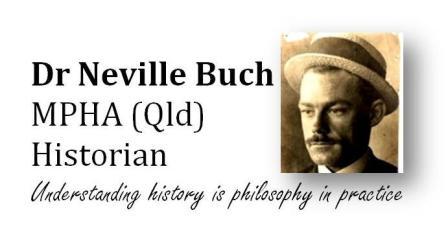
by Neville Buch | Jun 12, 2024 | Concepts in Public History for Marketplace Dialogue, Important Public Statement, Intellectual History
THE GLOBAL PROBLEM: MY LOCAL-REGIONAL-NATIONAL ACADEMIC AND POPULAR SCHOLARLY WORK
Robert Cady Saler (2024). “Death to the World” and Apocalyptic Theological Aesthetics, T&T Clark (Bloomsbury), pp. 152, e-book US$ 122.41 discounted, hardcover US$ 153.00.
A MAJOR WAY TO A SOLUTION: A SHIFT IN SPIRAL HISTORIOGRAPHY
David Fergusson (2024). Reformed Humanism: Essays on Christian Doctrine, Philosophy, and Church, T&T Clark (Bloomsbury), pp. 304, e-book US$ 122.41 discounted, hardcover US$ 153.00.
*****
This blog article is both 1) a plea to be employed, or have a contract, to the level of my knowledge-base and skills, and 2) a clear demonstration that I am an academic and popular scholar at the global cutting-edge of several fields of knowledge, and 3), from the blog article, the question has to be ask why I am not employed or contracted in an Australian university or think-tank.
Two recently-published books is introduced as evidence: Robert Cady Saler’s “Death to the World” and Apocalyptic Theological Aesthetics, and David Fergusson’s Reformed Humanism: Essays on Christian Doctrine, Philosophy, and Church. The former is the global problem; and my local-regional-national academic and popular scholarly work in exploring, intellectually (i.e. what are the ideas), the problem. The latter is a major way to a solution; a likely shift based on my spiral historiography model. I cannot afford either books, currently, living off social security. However, I can ascertain that these books demonstrated that my work in the scoping of local, regional, and national “thinking” is at the global cutting-edge in research, writing, and publications.
Robert Cady Saler’s “Death to the World” and Apocalyptic Theological Aesthetics, this is what is said:
Robert Saler examines the small but influential Death to the World movement in US Eastern Orthodox Christianity. Presenting a case study in theological aesthetics, Saler demonstrates how a relatively small consumer phenomenon within US Eastern Orthodoxy sits at the centre of a variety of larger questions, including:
– The relationship between formal ecclesial and para-church structures
– The role of the Internet in modern religiosity
– Consumer structures and patterns as constitutive of piety
– How theology can help us understand art and vice versa
Understanding “Death to the World” as an instance of lived religion tied to questions of identity, politics of religious purity, relationships to capitalism, and concerns over conspiracy theory helps us to see how studies of uniquely American Eastern Orthodox identity must address these broader cultural strands.
David Fergusson’s Reformed Humanism: Essays on Christian Doctrine, Philosophy, and Church, this is what is said
The volume comprises a collection of essays ordered in three parts, each of which describes broadly the sub-fields of theology to which these belong. The essays tackle core themes in Christian doctrine, the longstanding relationship of theology to philosophy, and a series of challenges facing churches today. While the volume represents a Reformed theological approach often with a historical focus, it self-consciously reflects an ecumenical and critical perspective. The term ‘humanism’ reflects an openness to insight, understanding and correction from different fields of knowledge, while its ‘Reformed’ designation positions the work within a recognized theological tradition though seeking to avoid imprisonment by it.
A further feature of the collection is its attempt to overcome the curricular divisions between systematic theology, Christian ethics, and practical theology. The third section in particular deal with issues in social ethics, theological aesthetics, the place of the church in a secular culture, and the role of theology in the university.
Much of these insights have been published in my:
- Buch, N. (2024). Damien B. Schlarb, Melville’s Wisdom: Religion, Skepticism, and Literature in Nineteenth-Century America, Journal for the Academic Study of Religion, 37(1), Special Issue: New Perspectives on Religions and Traditions, 135-7, ISBN 978-0-197-58556-6 (hbk).
- Buch, Neville (2024). Queensland History, Religious Education, and Belief, in David W. Kim and Duncan Wright’s Socio-Anthropological Approaches to Religion: Environmental Hope, Edited by David W. Kim and Duncan Wright, London: Lexington Books.
- Buch, N. (2023). W. Y. Alice Chan, Teaching Religious Literacy to Combat Religious Bullying: Insights from North American Secondary Schools. Journal for the Academic Study of Religion, 36(2), 263–264. https://doi.org/10.1558/jasr.26719
- Buch, N. (2021).Book Review of Blin, Arnaud, War and Religion: Europe and the Mediterranean from the First through the Twenty-first Centuries, University of California Press, 2019, pp. 335, ISBN 9780520961753, Journal for the Academic Study of Religion, Volume 34, No 2.
- Buch, Neville (2021). The Intellectual Ethos of Charles Strong in Queensland 1855-1917, in Marion Maddox’s, Charles Strong’s Australian Church: Christian Social Activism, 1885–1917, University of Melbourne Press.
- Buch, Neville (2016). A Quest for a Fair Go: A History of the KSC in Queensland (with Beryl Roberts). Stafford, Qld. The Knights of the Southern Cross (Qld) (pp. 281).
- Buch, Neville (2015). No Regrets in the Evening of Life: The History of Junction Park State School (1888-2013). Boolarong Press (pp. 459).
- Buch, Neville (2014). Celebrating 40 Years. St Thomas More College, God’s Servant First (1974-2014). St Thomas More College (pp. 123).
- Buch, N. (2007). Religion Remain a Problem. The Skeptic. Summer 2007.
- Buch, N. (2007).The Value of the Secular. Quadrant. Volume 51, No. 1, March 2007.
Now, this is what what my colleagues do, who are employed or contracted at local institutions, but, looking at the chapter outline of each book, we find that I have translated the knowledge of global thinking into the local-regional-national public history and sociology:
Robert Cady Saler’s “Death to the World” and Apocalyptic Theological Aesthetics, this is listed:
Introduction: Marketplace and Identity. I have shown that its idiotic employment practices that skews the thinking on “big belief and doubt.”
1. Concepts in Public History for Marketplace Dialogue: https://drnevillebuch.com/concepts-in-public-history-for-marketplace-dialogue/
2. Neo-Orthodoxy Today from Historical Legacy: https://drnevillebuch.com/neo-orthodoxy-today-from-historical-legacy/
3. Lee A. Dew. The “Professional” Historian and Local History: https://drnevillebuch.com/lee-dew-professional-historian-local-history/
4. The American Modernism of The Great Gatsby: Concepts of Landscape, Persons, and Time-Past: https://drnevillebuch.com/the-american-modernism-of-the-great-gatsby-concepts-of-landscape-persons-and-time-past/
5. Essay 3 — The Spirit (1967-1975). Jesus Revolution (1967-1971). https://drnevillebuch.com/projects/intellectual-history/tcq/essay-3-the-spirit-1967-1975/
6. Public Transport System of Brisbane: A Conversation with the folk of South-East Queensland: https://drnevillebuch.com/public-transport-system-of-brisbane-a-conversation-with-the-folk-of-south-east-queensland/
Chapter 2: Reaching a Lost Generation: The Zine Begins. I have shown that the Lost Generation of a hundred years ago contributes to our current state of affair.
7. Spiral Historiography: 1. Widely-Believed Falsehood, 2. Accountability, 3. Falsehood Retreats, 4. Historical Forgetfulness: https://drnevillebuch.com/spiral-historiography-1-widely-believed-falsehood-2-accountability-3-falsehood-retreats-4-historical-forgetfulness/
8. The American Modernism of The Great Gatsby: Concepts of Landscape, Persons, and Time-Past: https://drnevillebuch.com/the-american-modernism-of-the-great-gatsby-concepts-of-landscape-persons-and-time-past/
9. Jesus Revolution: Film Propaganda or History? https://drnevillebuch.com/jesus-revolution-film-propaganda-or-history/
Antiquarianism, Intellectual Confusion, and the Worship of Unintelligent Fiction: https://drnevillebuch.com/antiquarianism-intellectual-confusion-and-the-worship-of-unintelligent-fiction/
8. D.H. Lawrence’s Kangaroo (1923): One Hundred Years On, Questioning Social Philosophy and Policy for Today: https://drnevillebuch.com/d-h-lawrences-kangaroo-1923-one-hundred-years-on-questioning-social-philosophy-and-policy-for-today/
9. The Grapes of Wrath: A Retrospect on the Folkish Expression of Justice in Popular Culture and Family: https://www.academia.edu/42816377/The_Grapes_of_Wrath_A_Retrospect_on_the_Folkish_Expression_of_Justice_in_Popular_Culture_and_Family
10. The Memories – Road Trip Day 2: Neville Still Alive, Ruth as History, the Great Journey we Wanted: https://drnevillebuch.com/the-memories-road-trip-day-2-neville-still-alive-ruth-as-history-the-great-journey-we-wanted/
11. Sigmund Freud and C.S. Lewis, The Humanist Overlap and Differences: Humanist Brisbane (Humanists Australia) Film and Dinner Event, Monday April 1 (Easter Monday). https://drnevillebuch.com/sigmund-freud-and-c-s-lewis-the-humanist-overlap-and-differences-humanist-brisbane-humanists-australia-film-and-dinner-event-monday-april-1-easter-monday/
12. Brisbane Humanists Film and Dinner Discussion: The Way, My Way. https://drnevillebuch.com/brisbane-humanists-film-and-dinner-discussion-the-way-my-way/
Chapter 3: Revival and Influence. I have shown the role of the American Revivalist Tradition (ART) in our state of affair.
13. American influence on Protestantism in Queensland since 1945; Neville Douglas Buch, School of History, Philosophy, Religion, and Classics, The University of Queensland, 1995: https://www.textqueensland.com.au/item/thesis/fc385b39583707b141ce48f5a966ee7f
14. RESEARCH NOTE: ANGLO-AMERICAN MAJOR BELIEF-DOUBT SYSTEMS: https://drnevillebuch.com/research-note-anglo-american-major-belief-doubt-systems/
15. The American Revivalist Tradition Mark II: https://drnevillebuch.com/services/religion-secular-history/the-american-revivalist-tradition-mark-ii/
16. Why the Disciplines and No Apologetics? Part 1: The Collapse of Schaefferan Apologetics: https://drnevillebuch.com/why-the-disciplines-and-no-apologetics-part-1-the-collapse-of-schaefferan-apologetics/
Chapter 4: Whose Authority to Fight? I have shown that it is right and proper to resist unjust authority, even when it is “of the people.”
17. Why the Disciplines and No Apologetics? Part 1: The Collapse of Schaefferan Apologetics: https://drnevillebuch.com/why-the-disciplines-and-no-apologetics-part-1-the-collapse-of-schaefferan-apologetics/
18. IDRlabs.com 8 Values Political Test: Why informing opinion is better than behavioural psychology? https://drnevillebuch.com/idrlabs-com-8-values-political-test-why-informing-opinion-is-better-than-behavioural-psychology/
19. The 2024 State of the Union Speech: Commentary from an Australian-American Relational Historian: https://drnevillebuch.com/the-2024-state-of-the-union-speech-commentary-from-an-australian-american-relational-historian/
Chapter 5: Theological Potential(S). I have shown that the potential of theology in Australia.
20. RESEARCH NOTE: ANGLO-AMERICAN MAJOR BELIEF-DOUBT SYSTEMS: https://drnevillebuch.com/research-note-anglo-american-major-belief-doubt-systems/
21. Concept, Semantics, and Strategies for the Level Playing Field: https://drnevillebuch.com/concept-semantics-and-strategies-for-the-level-playing-field/
22. 2024-03-13 Habermas and Public Theology Presentation Text and PowerPoint.
23. The Language and Ignorance of the Culture Warrior and Knowledge of Religion & Culture in Late 20th Century Queensland: https://drnevillebuch.com/the-language-and-ignorance-of-the-culture-warrior-and-knowledge-of-religion-culture-in-late-20th-century-queensland/
24. Revelatory and Recovery Moments: Assessing Life’s Journeys and Directions: https://drnevillebuch.com/revelatory-and-recovery-moments-assessing-lifes-journeys-and-directions/
25. D.H. Lawrence’s Kangaroo (1923): One Hundred Years On, Questioning Social Philosophy and Policy for Today: https://drnevillebuch.com/d-h-lawrences-kangaroo-1923-one-hundred-years-on-questioning-social-philosophy-and-policy-for-today/
David Fergusson’s Reformed Humanism: Essays on Christian Doctrine, Philosophy, and Church, this is listed:
Part One: Christian Doctrine: 2. The Power of God: Its Use and Abuse as a Theological Concept. I have shown that the historiographical use and abuse in the Image of God (imago dei).
26. Neo-Orthodoxy Today from Historical Legacy: https://drnevillebuch.com/neo-orthodoxy-today-from-historical-legacy/
27. RESEARCH NOTE: ANGLO-AMERICAN MAJOR BELIEF-DOUBT SYSTEMS: https://drnevillebuch.com/research-note-anglo-american-major-belief-doubt-systems/
28. Why the Disciplines and No Apologetics? Part 1: The Collapse of Schaefferan Apologetics: https://drnevillebuch.com/why-the-disciplines-and-no-apologetics-part-1-the-collapse-of-schaefferan-apologetics/
29. Revelatory and Recovery Moments: Assessing Life’s Journeys and Directions: https://drnevillebuch.com/revelatory-and-recovery-moments-assessing-lifes-journeys-and-directions/
Part One: Christian Doctrine: 5. Providence. I have shown what the role of providence has in our current state of affairs.
30. Brewer’s Insights on Popular Historiography: https://drnevillebuch.com/brewers-insights-on-popular-historiography/
31. Revelatory and Recovery Moments: Assessing Life’s Journeys and Directions: https://drnevillebuch.com/revelatory-and-recovery-moments-assessing-lifes-journeys-and-directions/
32. What is Wrong with “the world”: A Christmas Thought in Our Violent Times: https://drnevillebuch.com/what-is-wrong-with-the-world-a-christmas-thought-in-our-violent-times/
Part Two: Philosophy: 8. Hume as Religious Sceptic. I have shown what the role of skepticism has in our current state of affairs.
33. Rationalism & Skepticism History: https://drnevillebuch.com/services/rationalism-skepticism-history/
34. Neo-Orthodoxy Today from Historical Legacy: https://drnevillebuch.com/neo-orthodoxy-today-from-historical-legacy/
35. A Brief Look at Psychological Theories in Group Psychology, and Epistemology: https://drnevillebuch.com/a-brief-look-at-psychological-theories-in-group-psychology-and-epistemology/
Part Two: Philosophy: 9. Adam Smith on Ethics and Religion. I have shown that market ethics is what theory articulates in the current state of affairs.
36. Synopsis for Book Project: Education for Faith and Belief – Religious Instruction, Religious Education, and Christian Education in Queensland 1875-2020: https://drnevillebuch.com/synopsis-for-book-project-religious-instruction-religious-education-and-christian-education-in-queensland-1875-2020/
37. Letter: Education ? All Types of Placement poverty in Australia: https://drnevillebuch.com/letter-education-all-types-of-placement-poverty-in-australia/
38. 2023-08-28 Plea to the Queensland State Government: https://drnevillebuch.com/2023-08-28-plea-to-the-queensland-state-government/
Nietzsche and Methods of History – Being Active
Part Two: Philosophy: 10. Natural Theology After Darwin. I have shown what the role of naturalism has in our current state of affairs.
39. Synopsis for Book Project. Horizon Worldviews: The Makings of A Broad Society In Queensland 1911-2001 (a Philosophic History): https://drnevillebuch.com/synopsis-for-book-project-horizon-worldviews-the-makings-of-a-broad-society-in-queensland-1911-2001-a-philosophic-history/
40. Mapping Locations on the Mind-Brain Belief Spectrum: https://drnevillebuch.com/mapping-locations-on-the-mind-brain-belief-spectrum/
41. The Ontological Compass: https://drnevillebuch.com/the-ontological-compass/
42. RESEARCH NOTE: ANGLO-AMERICAN MAJOR BELIEF-DOUBT SYSTEMS: https://drnevillebuch.com/research-note-anglo-american-major-belief-doubt-systems/
Part Three: Church: 11. Theology of Worship: A Reformed Perspective. I have shown what the role of Reformed Theology has in our current state of affairs.
43. Neo-Orthodoxy Today from Historical Legacy: https://drnevillebuch.com/neo-orthodoxy-today-from-historical-legacy/
44. Antiquarianism, Intellectual Confusion, and the Worship of Unintelligent Fiction: https://drnevillebuch.com/antiquarianism-intellectual-confusion-and-the-worship-of-unintelligent-fiction/
45. Sartre on Humanism – Annotated. CRT No. 2: https://drnevillebuch.com/sartre-on-humanism-annotated-crt-no-2/
Part Three: Church: 12. Reformed Theology and Visual Culture. I have shown that what the cultural impacts are from Reformed Theology in our current state of affairs.
46. Why the Disciplines and No Apologetics? Part 1: The Collapse of Schaefferan Apologetics: https://drnevillebuch.com/why-the-disciplines-and-no-apologetics-part-1-the-collapse-of-schaefferan-apologetics/
47. Synopsis for Book Project: Education for Faith and Belief – Religious Instruction, Religious Education, and Christian Education in Queensland 1875-2020: https://drnevillebuch.com/synopsis-for-book-project-religious-instruction-religious-education-and-christian-education-in-queensland-1875-2020/
48. Essay 2 — Historical Overview. The Days of “Teen Challenge Inc. Antecedence.” https://drnevillebuch.com/projects/intellectual-history/tcq/essay-2-historical-overview/
Part Three: Church: 13. Mapping the Church: Current Challenges of History and Mission. I am continuing to mapping the local Church culture.
49. Mapping Brisbane History Project: https://mappingbrisbanehistory.com.au/
Part Three: Church: 14. The Bible in Modernity. I have shown that American modernism has shaped the global reading of the Bible.
50. Concepts in Public History for Marketplace Dialogue: https://drnevillebuch.com/concepts-in-public-history-for-marketplace-dialogue/
51. Neo-Orthodoxy Today from Historical Legacy: https://drnevillebuch.com/neo-orthodoxy-today-from-historical-legacy/
52. Lee A. Dew. The “Professional” Historian and Local History: https://drnevillebuch.com/lee-dew-professional-historian-local-history/
53. The American Modernism of The Great Gatsby: Concepts of Landscape, Persons, and Time-Past: https://drnevillebuch.com/the-american-modernism-of-the-great-gatsby-concepts-of-landscape-persons-and-time-past/
Part Three: Church: 15. Reformed Social Theology: Contexts and Constants. I have shown that Reformed Social Theology is skewed in a misunderstanding of conservatism.
54. Why the Disciplines and No Apologetics? Part 2: The History and Future of Apologetics Courses in Christian colleges: The Historiographical Challenges from Marc Bloch (1886-1944): https://drnevillebuch.com/why-the-disciplines-and-no-apologetics-part-2-the-history-and-future-of-apologetics-courses-in-christian-colleges-the-historiographical-challenges-from-marc-bloch-1886-1944/
Part Three: Church: 16. Theology and Therapy. I have given examples of therapy-driven theology, which is not all bad, but always misses something intellectually.
55. Synopsis for Book Project. The Educated Society, Queensland 1859-2009 – Landscape and Culture in the Groundwork of the Mapping Brisbane Education Project: https://drnevillebuch.com/synopsis-for-book-project-the-educated-society-queensland-1859-2009-landscape-and-culture-in-the-groundwork-of-the-mapping-brisbane-education-project/
56. Essay 9 — Learning the Lessons for Teen Challenge Inc. Australia (1957-2020): https://drnevillebuch.com/projects/intellectual-history/tcq/essay-9-learning-the-lessons-for-teen-challenge-inc-australia-1957-2020/
57. The History of Ruth 1: https://drnevillebuch.com/projects/personal-history/the-history-of-ruth/the-social-worker/cathy-martin-24-may-2014/
58. The History of Ruth 2: https://drnevillebuch.com/projects/personal-history/the-history-of-ruth/the-long-journey/margaret-warnick-19-may-2017/
Part Three: Church: 17. The Place of Christian Theology in the University. I have shown that higher education and universities have failed according to our large, and often entangled, horizon worldviews.
59. Synopsis for Book Project. Horizon Worldviews: The Makings of A Broad Society In Queensland 1911-2001 (a Philosophic History): https://drnevillebuch.com/synopsis-for-book-project-horizon-worldviews-the-makings-of-a-broad-society-in-queensland-1911-2001-a-philosophic-history/
60. Teaching Projects: https://drnevillebuch.com/projects/teaching-projects/
With this evidence that 1) for a plea to be employed, or have a contract, to the level of my knowledge-base and skills, and 2) a clear demonstration that I am an academic and popular scholar at the global cutting-edge of several fields of knowledge, then 3), from the blog article, the question has to be ask why I am not employed or contracted in an Australian university or think-tank.
I end this blog article with a series of public statements on my work:
“…give me time to absorb Neville’s work and schedule a meetup with you so you and I can also go ‘NEXT level’.”
“I should mention that I read the paper on Runcorn that you e-mailed me in the summer and enjoyed it a lot.” [a global sociologist from the United States]
“By contrast, studies of individual schools are comparatively rare in the periodical literature for 2016, although some are mentioned in other sections of this review. Two articles in the Australian journal History of Education Review are exceptions: Neville Douglas Buch and Beryl Roberts present a quantitative study of pupils from a Brisbane school in the early twentieth century, while Tony James Brady considers the education of warders’ children at the St Helena Penal Establishment in Queensland in the late nineteenth.”
“Thanks for that reference, I have read it. What a pleasant change, to see an academic reference to support a point of view.”
“Yours has the distinction of being the last paper I edited for Lucas at the end of my 30 year stint. It was a good note on which to finish.”
“That’s a great strong letter you’ve written there. I hope you get a response and a result.”
“Many thanks Neville for the kind message. And apologies for the inevitable silence which must descend as I try to makes sense of, and contribute to, a very different role. But appreciate your support and encouragement along the way.”
“Your project proposal exploring the foundations of the History profession in Queensland and the importance of UQ’s historians, was highly regarded by the panel.”
“I want to express my appreciation for your recent application for the position of Program Director (The Queensland Commitment) R-38317. Your interest in joining The University of Queensland truly means a lot to us, and we are genuinely appreciative of the effort and time you dedicated to your application.”
******























